Croatian Declared Official Language 174 Years Ago
ZAGREB, 23 Nov 2021 - Parliament recalled on Tuesday that Croatian was declared the official language instead of Latin 174 years ago today.
The Sabor adopted the historic decision on the official use of the national language on 23 October 1847 and parliament started using it in its work in 1848.
At the last Sabor session of 1847, Ivan Kukuljević Sakcinski warned the people's representatives about the need to introduce the official language in public services. At his proposal, parliament adopted a conclusion to that effect.
The introduction of Croatian as the official language was preceded by 50 years of political struggle, notably revivalist attempts to adopt and apply a uniform orthography and adopt the Shtokavian dialect as the basis of the official language.
The first address in Croatian was delivered in parliament by Kukuljević Sakcinski on 2 May 1843.
Kukuljević Sakcinski (1816-1889), a Croatian politician, historian, and author was one of the leaders of the Croatian National Revival, also known as the Illyrian movement.
For more, make sure to check out our dedicated lifestyle section.
How Difficult Is It to Learn the Croatian Language?
October 24, 2021 - I don't consider myself halfway to being able to speak the Croatian language fluently, but I think there are definitely some factors that have helped me streamline the process and that can help you as well, and they are worth sharing.
It is unlikely, but not impossible, to find someone who wants to study the Croatian language without a particular reason, that is, for the simple fact of learning Croatian. Especially if you are someone with no background in Slavic language learning, it can be quite challenging, and for many even demotivating. Among those who studied the Croatian language out of curiosity, I found Erasmus students from countries such as Poland, Ukraine, or the Czech Republic, and I have also met people from Bosnia, Slovenia, and Macedonia, who despite speaking different languages, studied Croatian without problems or spoke it very fluently in very little time.
It was not the case of my colleagues from countries like Italy, Spain, Portugal, England, or France. Neither was it for me, from Peru, nor my friends from Argentina, Chile, Bolivia, or Colombia, of which the vast majority studied the language as part of the scholarship offered by the Central Office of the State for Croats outside the Republic of Croatia, with the intention of learning more about the country of their ancestors or taking the first steps within their new life project in Croatia. Our vocabularies, grammar rules, and even alphabets may be relatively similar, but they are very different from those of the Slavic languages. Along the way, one notices that certain words can be shared and thus help to understand in a certain way the context of what is heard or read, but by no means reveal their full meaning.
Some examples are:
- situation (English) - situación (Spanish) - situacija (Croatian)
- politician - político - političar
- museum - museo - muzej
- linguistics - linguística - lingvistika
On the other hand, as in Croatian, we also conjugate verbs almost exclusively for each noun according to whether it is first, second or third person, or if it is singular or plural. While in English it is possible that verbs change very little under these same considerations.
For example, with the verb eat:
In English (to eat):
- I eat.
- You eat.
- (He/she/it) eats.
- We eat.
- You eat.
- They eat.
In Spanish (comer):
- Yo como.
- Tú comes.
- (Él/ella) come.
- Nosotros comemos.
- Ustedes comen.
- Ellos comen.
In Croatian (jesti):
- Ja jedem.
- Ti jedeš.
- On/ona/ono jede.
- Mi jedemo.
- Vi jedete.
- Oni/one/ona jedu.
Those of us who speak Spanish could say that, in a certain way, there are reasons to accommodate ourselves to the study of the Croatian language from certain angles, such as the fact that our language also has a large number of grammatical rules and conjugations, as well as the presence of the genres. However, the Croatian language has declensions, which do not happen in Spanish. For instance:
- La ciudad. (The city) - Grad (Case: Nominativ)
- Me voy a la ciudad. (I'm going to the city) - Idem u grad. (Case: Akuzativ)
- Vivo en la ciudad. (I live in the city) - Živim u gradu. (Case: Lokativ)
- Junto a la ciudad. (Next to the city) - Pored grade. (Case: Genitiv)
- Él debatirá con la ciudad. (He will debate with the city) - Raspravljat će s gradom. (Instrumental)
As you can see, in Spanish, the noun city does not change in its form while the case does, but in Croatian, the noun changes its form according to declension. Although I mentioned earlier that in Spanish, as in Croatian, nouns can also be classified by gender, this does not affect the way the verbs that accompany them are conjugated. For instance:
- Él fue a la ciudad. (He went to the city) / Ella fue a la ciudad. (She went to the city) - Otišao je u grad. / Otišla je u grad.
Also, we are not very used to putting together sentences where nouns are not accompanied by articles. For example:
- A ellos les gusta la pizza. (They like pizza) - Vole pizzu.
However, some things may be familiar to those who speak English, as the articles next to the nouns are in many cases dispensable, as in the example above. But even if a few little things may favor those who speak English, in the end, they will find themselves entangled in a language laden with declensions and gender, contrary to the neutral language they possess.
Now, I am not a linguistics student, much less an expert, so I do not dare to analyze or delve further into the history and rules of each language. However, and taking into account the advantages and obstacles that can arise when learning a language as challenging as Croatian, I think there are five ways in which you can learn it not only faster and with greater ease, but also in an entertaining way.
1. Enroll in a course to learn the Croatian language
Probably the best alternative, enrolling in a course to learn the Croatian language has many advantages. For example, as you progress through the topics and levels, you will have the opportunity to consult with your teacher, usually someone born in Croatia, about something that you have not understood well or something about which you need more information regarding the Croatian language. Also, the homework assignments and tests that you have to take throughout the course will help you put your learning to the test. You will also have study material that you may not find elsewhere, and you will study with colleagues who probably have the same level as you and in whom you will find support. If you are interested in studying the Croatian language in Croatia, you can review the bases to apply for the Croatian language course scholarship in the Republic of Croatia, or you can also review the courses offered by the Croaticum in Zagreb.
2. Practice with your friends or partner from Croatia
The good thing about having a Croatian-born partner, or Croatian friends, is that you don't need to live in Croatia to practice or continue learning the language. If that person is willing to teach you, and you commit to studying, you will notice that it can be very easy and entertaining. Since they were born in Croatia, you will not only learn grammar rules and declensions, but you will also be able to learn pronunciation. Chances are that they will surely appreciate your interest in learning the language!
3. Be encouraged to speak Croatian in everyday situations
If you live in Croatia, or even if you study the Croatian language there, I can tell you that it is probably not enough to do summaries in your notebook, assignments, exams or many hours of study. In the end, if you are studying a language it is precisely so that you can speak it. It is best to avoid intermediary languages as much as possible. Although in Croatia you will realize that English is spoken by a large part of the population, encourage yourself to practice what you know of Croatian when shopping, at the post office, in a cafe, in the bar, or even with strangers on the street! And there are two reasons why you will love this option. The first reason is that you will gain more confidence to speak Croatian, and the second is because Croatians are aware that their language can be complicated, so they will help you with what you do not know well and will motivate you to continue improving.
4. Watch movies or series with Croatian audio or subtitles
When I arrived in Croatia, several of my Croatian friends recommended me to watch Croatian movies or series, and at first, I thought that it could be a bit cliché and that it might not help me much to learn the language. Yes, it is true that when watching a Croatian movie or series you will not be able to decipher the declensions or understand the grammar rules, but it will help you to associate some expressions, phrases, or common words used by Croats. I would recommend that you first watch movies with audio in your native language or in English, but with Croatian subtitles. Then, try watching movies or series with Croatian audio, and with subtitles in your native language or in English. This way you will practice not only your vocabulary but also your pronunciation and the contexts in which you can use new expressions in Croatian.
5. Change the language of any of your electronic devices
Today, smartphones and other electronic devices have become essential tools to learn a new language or function during a trip abroad. For example, Google Translate works very well for translating from English to Croatian and vice versa, and it continues to improve over time. Nowadays, it allows you not only to translate words or sentences that you write yourself, but you can also upload photos or scan a text in Croatian, and the application will translate it for you very effectively. On the other hand, the latest iPhone and its operating system allow you to detect texts through your camera and even in your photographs, and that way you can achieve results very quickly.
However, my main advice is to change the main language of your phone, at least from time to time. As we are very aware of our phones through social networks or work, it is likely that we have already become accustomed to frequent texts and messages that we see on different platforms: ''send message'', ''log out'', ''update'', ''download video'', ''share image'', ''like'', ''comment'', etc. Once your phone is in another language, you will find the same messages, but this time in Croatian, and with time you can get used to it!
The Croatian language is difficult, but not impossible. Once you find the trick, you will realize that it is a language very rich in history and you will find pleasure and motivation to learn it. Do not be discouraged!
For more on lifestyle in Croatia, follow TCN's dedicated page.
Eighth-Graders in Serbia Taught That Croatian Language Does Not Exist
ZAGREB, 4 Oct 2021 - The political leadership of Croats in Serbia on Monday condemned the denial of the Croatian language in grammar books for eighth-graders, noting that examples like this one show why negative sentiments among young people in Serbia about Croats should not be surprising.
The Croatian language in Serbia does not exist, Democratic Alliance of Vojvodina Croats (DSHV) head Tomislav Žigmanov said, adding that "this is just the tip of the iceberg of the social context affecting the status of Croats in Serbia."
According to the local Croat-language weekly "Hrvatska riječ", a grammar book for eighth- graders by a group of authors says that the Serbian, Slovenian, Macedonian, and Bulgarian languages are South Slavic languages while "Croats, Bosniaks and some Montenegrins call the Serbian language Croatian, Bosnian, Bosniak or Montenegrin."
The textbook was approved by the Serbian Institute for the Promotion of Education, the weekly says, noting that it had contacted the competent institutions in that regard.
"As regards language as a linguistic and political category, our position is that it is up to the authors of the textbook to provide an explanation. The matter is covered sufficiently in textbooks and there are also experts on the Serbian language at the Institute who check textbooks," the Committee for the Standardisation of the Serbian Language said in its reply to the weekly, among other things.
"The Serbian education system denies our language. We should therefore not be surprised by the views of children who are taught from such books," the DSHV said in a Twitter post, with Žigmanov citing as an example of the negativity associated with Croats the declaration of the Bunjevci ikavian dialect as an official, non-Croatian language in Subotica in May this year.
The Subotica Town Council earlier this year amended the town statute to declare the Bunjevci dialect one of the four official languages in that town, along with Serbian, Croatian and Hungarian. The demand for declaring its speech an official language in Subotica was made by the Bunjevci community, which denies its belonging to the Croatian people.
"It is a paradox that Croatian, an official EU language, is being denied in Serbia and that the status of an official language is awarded to the so-called Bunjevci language, which is not recognized anywhere else in the world and cannot be recognized in the full sense of that word," Žigmanov said.
For more on politics, follow TCN's dedicated page.
For more about Croatia, CLICK HERE.
Do You Speak Naški?: Much Loved Semi-Compounds
September 28, 2021 - TCN contributor and Zagreb translator Ana Juzbašić walks us through the much-loved semi-compounds of the Croatian language in our newest series Do you speak naški?
The Croatian language loves to portray a situation or a person using semi-compounds. Some have their English counterparts, some do not. They usually rhyme so they are easy to remember. Considering the fact that people learn best via context and visualization, we are going to do exactly that.
1) You are in college and your parents called. They are coming over unexpectedly and your apartment is a giant mess. Well, what you need to do is to make everything cakum-pakum (=spick and span) before they pull over on the driveway!
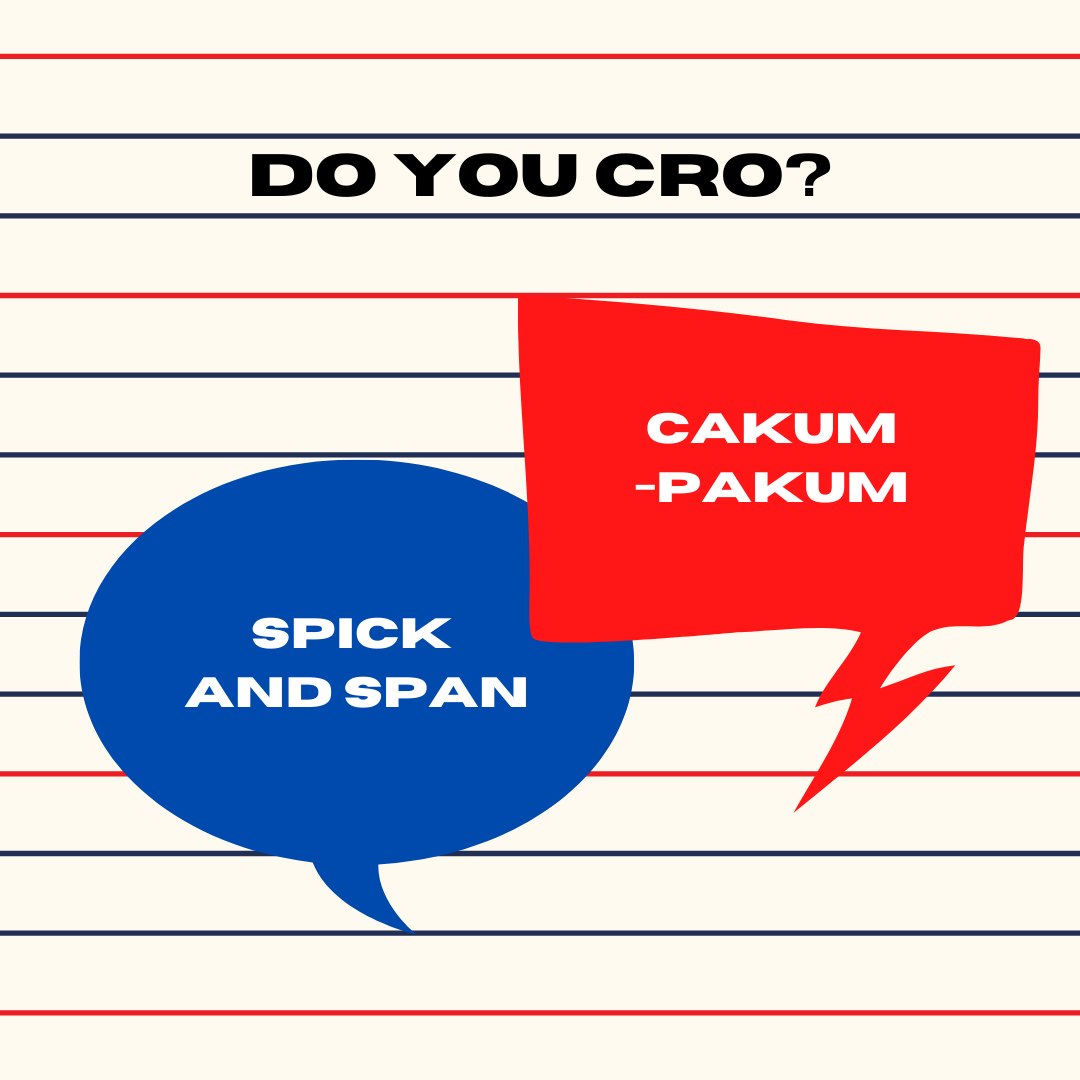
2) Ladies and gentlemen, may I present you with evidence of all evidence. John heard it from Katie, Katie told Jackie, so she told her sister and her sister told me. Hey, I don’t believe you, that’s all a bunch of rekla-kazala (=hearsay).
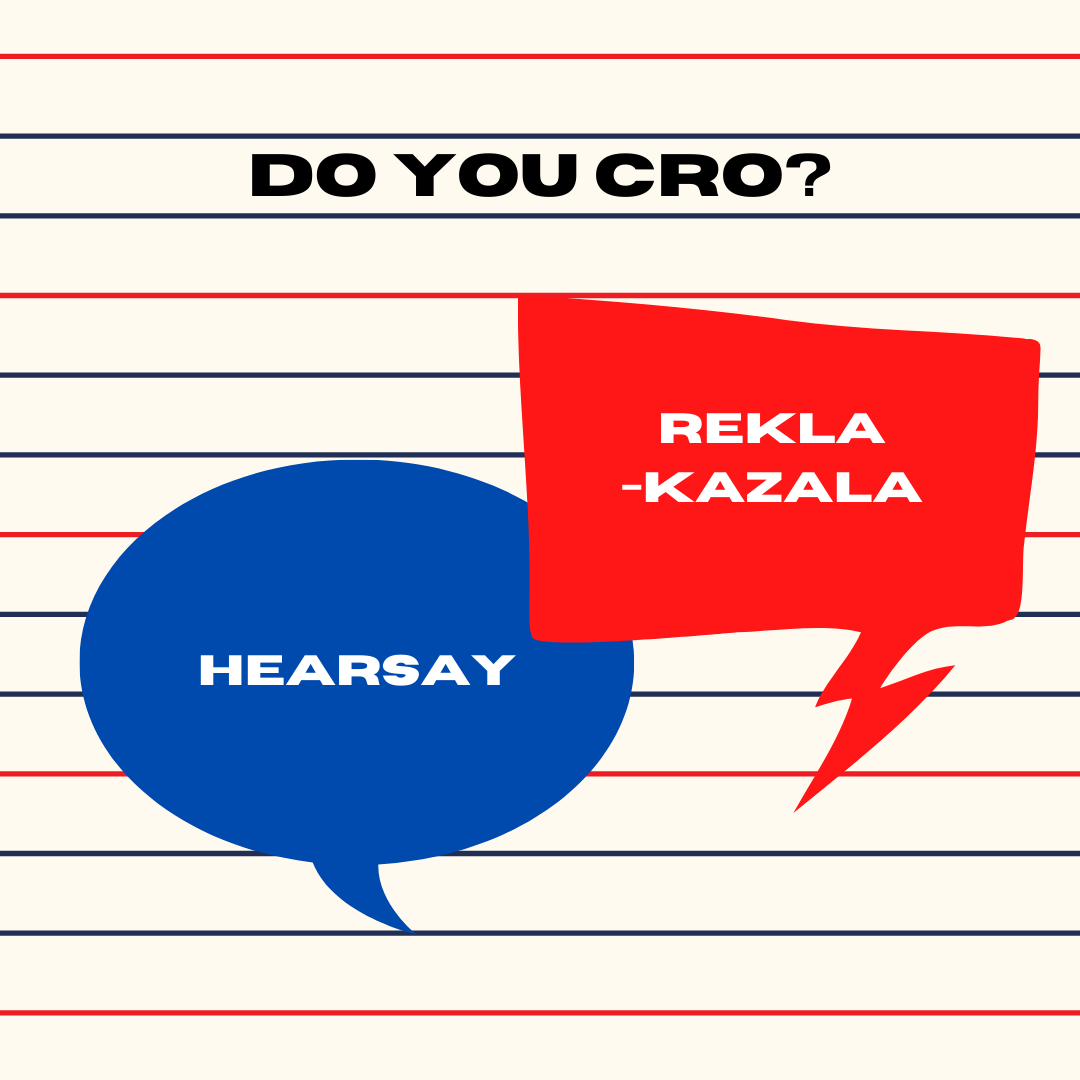
3) Were you ever in a situation where you had to pass an exam in order not to fail a year in college? Well, let me present you with the stani-pani (=when push comes to shove) situation, a situation where there is no place for procrastination, you just have to suck it up and do it.
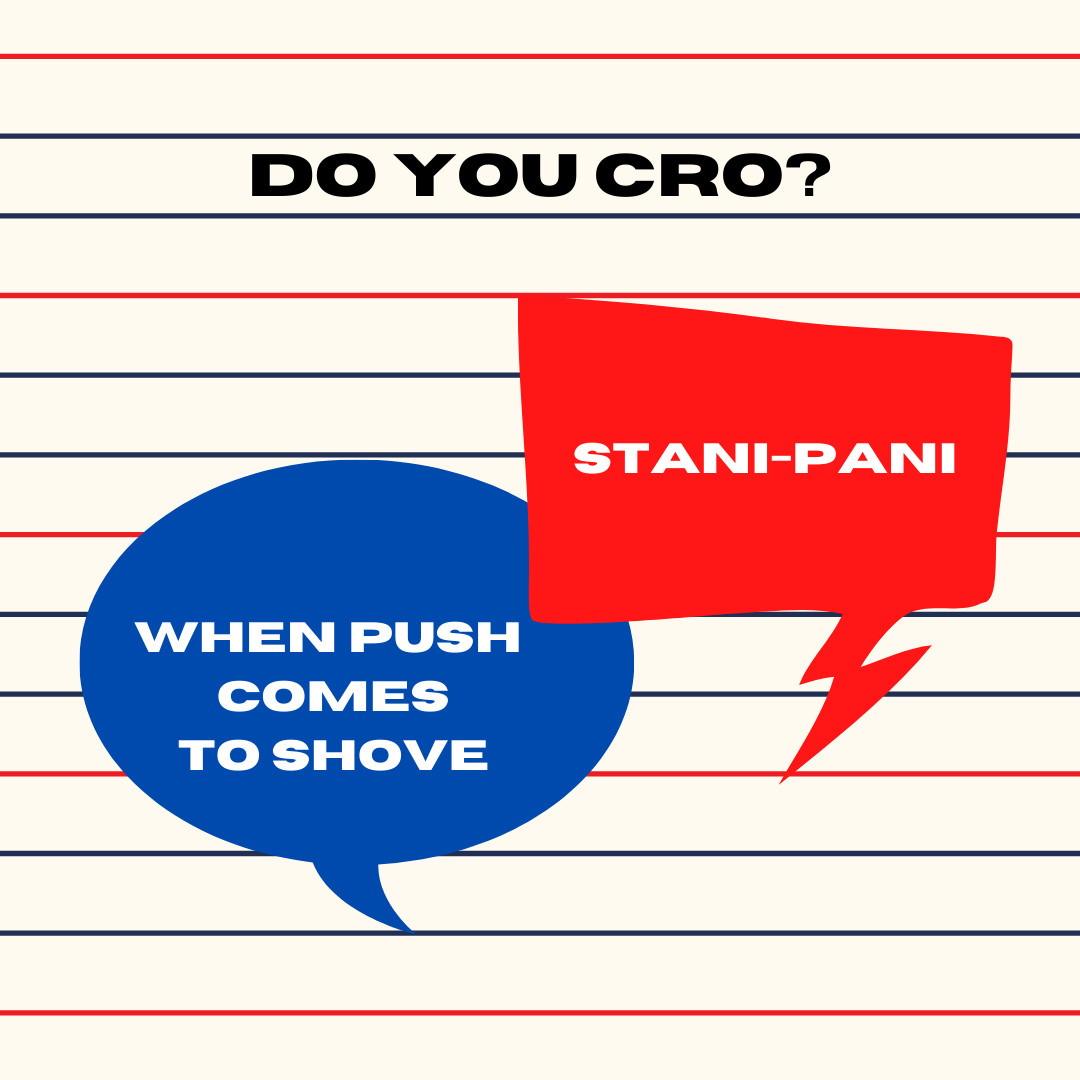
4) When you have an idea you don’t want to give it up. You would do it no matter what and pošto-poto (=under any circumstances).
5) Moving along the same lines. There is another phrase of similar meaning. When you want to say something happens regularly regardless of the circumstances. He goes for a morning jog before work, orilo-gorilo (= rain or shine).

6) Your friend got an idea. It makes no sense at all. Something like I’m going hiking on Kilimanjaro. You’ll probably say to him/her: You are crazy skroz-naskroz (=all the way).
Hope you learned some new words and pulled the parallel with English! Until next time!
Sources:
https://hrcak.srce.hr/file/166942
For more on lifestyle in Croatia, follow TCN's dedicated page.
2021 European Languages Day: Varaždin Celebrates German Language Learning
September 25, 2021 - The 2021 European Languages Day was celebrated at the Franciscan square in Varaždin. Pupils presented souvenirs honoring Germany and the German language.
'Gore gore gore gore' (hills burn worse up there) is one of those sentences that show how weird but cool the Croatian language can be. Add interesting phrases to the equation, and you can understand why Croatians are proud and want to preserve their language.
But Croatians also respect other languages too.
As reported by the Varaždinske Vijesti website, September 25 marked the European Day of Languages.
Under the motto "Deutsch ist Nah!" Varaždin's Franciscan square saw five Varaždin elementary schools, the Varaždin high school, and ten schools from Varaždin County celebrate the event with a suitable program.
„Given that we as teachers recognized the importance of multilingual education, we decided to shed light on the German language, which is important for Varaždin County, both because of geography but also for the economy. In teaching, we address communicative approach and active, vocal communication and active usage of the German language which is very significant in our area“, Vidovec Elementary school German language teacher Lea Lesar Dolenc told for Varaždinske Vijesti.
Dolenc is the initiator of the project that is run along with the European Culture Circle EKULT Association for the popularisation of the German language. The program that lasted from 10 AM to 1 PM saw the presentation of souvenirs with symbols of the Federal Republic of Germany made by the pupils from participating schools.
Apart from German, as former British Ambassador Andrew Dalgleish noted for TCN, Croatians speak English very well too.
When it comes to language learning in Croatia, apart from various courses and private schools, the Faculty of Humanities and Social Sciences (FFZG), part of the University of Zagreb, is the most pristine high-education facility that educates its students to be translators. As well as understand various languages and cultures that tag along with lingual expressions. Additionally, FFZG is the home to Croaticum.
„Croaticum – Centre for Croatian as a Second and Foreign Language is the oldest and largest institution engaged in teaching, research, and description of Croatian as a second and foreign language. It is part of the Department of Croatian Language and Literature at the Faculty of Humanities and Social Sciences of the University of Zagreb, the largest Croatian academic institution specializing in social studies and humanities. Croaticum is renowned for its tradition, expertise, and knowledge“, says the Croaticum website, an institution founded back in 1962.
Commemorating the learning of second languages by celebrating the European Day of Languages is now a twenty-year-long tradition, as it was founded in 2001.
„Throughout Europe, 800 million Europeans are represented in the Council of Europe's 47 member states, and all are encouraged to discover more languages at any age, as part of or alongside their studies. This stems from the Council of Europe’s conviction that linguistic diversity is a tool for achieving greater intercultural understanding and a key element in the rich cultural heritage of our continent. Therefore, the Council of Europe, in Strasbourg, promotes plurilingualism in the whole of Europe“, explains the European Language Day website.
Learn more about Varaždin in our TC guide.
For more about culture in Croatia, follow TCN's dedicated page.
Croatian Language Scholarship: Ten Things You Need to Know Before Arriving
September 6, 2021 - With the final list of the Croatian language scholarship recipients already published, many are packing their bags and others are already exploring Croatia before starting their classes. However, some still wonder about many things related to the course. What should they know before arriving?
On May 14th of this year, the Central State Office for Croats outside the Republic of Croatia announced the call to apply for the scholarship to study the Croatian language in four cities: Zagreb, Split, Rijeka, and Osijek. Applications were closed on June 14th, and the first list of scholarship recipients was published at the end of July. Later, after seven days of appeals by those who did not appear on the first list and others who desisted, a second and final list was published on August 17th.
Although the exact dates for the start of classes are not yet confirmed, it is expected to take place in the first week of October. We wish it were as simple as going from the airport to your desk and starting your Croatian language classes, but there are many things you should take into account before and when you arrive in Croatia (if you are traveling for the first time). Before we begin with the list, it is important to add at this point that there are three contacts with whom you will communicate before, during, and even after your participation in the course, and all three are in charge of different aspects of the scholarship. One is the Central State Office for Croats outside the Republic of Croatia, which is a government body that finances and organizes scholarships to study the Croatian language in the Republic of Croatia. The second is the Croatian language studies department at the Faculty of Philosophy of the city to which you have applied. Finally, you will also communicate with the accommodation in which you will stay during your studies.
Without further a due, here are ten things to keep in mind:
1. Confirm your participation in the course
After seeing your name once the first list was published in July, you probably took your participation in the course for granted. Although it is true that being on the list means having obtained a place to study the Croatian language in Croatia and access certain benefits, it is necessary to confirm your participation, as sometimes it happens that some do not show up or withdraw from their participation. So that the Office in charge can properly prepare the logistics behind the course, make sure to check your mail (both in your inbox and in the spam box). You will find an email asking you to confirm your participation in the course, as well as other instructions.
Weeks prior to your arrival you will receive emails with information about your classes, such as your schedule or classroom. In some cases, you will be asked to take a pre-test online to determine your current level of Croatian. Don't worry, it's just to get an idea.
Note: if you have not received a confirmation email, be sure to write to This email address is being protected from spambots. You need JavaScript enabled to view it. and confirm your participation, as well as ask for additional information about the scholarship.
2. Confirm your accommodation
As well as confirming your participation in the Croatian language course scholarship, you will also need to confirm your accommodation, if you qualify for it. The Croatian language scholarship includes a stay in student accommodation in your city, but places are limited. A number of accommodation places have been assigned by each city. For example, 50 places were assigned for accommodation in Zagreb, and to find out if one corresponds to you, you must check your order in the final list of the Croatian language scholarship recipients. If you are in the top 50 on the list for Zagreb, you will most likely have an accommodation quota. Why do I say "most likely"? Because it must be taken into account that:
a) The accommodation right is only given to those younger than 36.
b) Not everyone asked for accommodation on their applications.
That is why we recommend you check your email for any communication from the student accommodation office of your city, in which they will inform you that you are part of the list of those to stay in student accommodation. If not, write an email to the Central Office as in the previous point, since they are the ones who determine the list of students to stay in the student accommodation.
Note: if you have received an email from the student accommodation office, in addition to requesting a confirmation, they will also ask you in advance to indicate the date you plan to check in. Likewise, some student accommodation may request a medical certificate, the format of which will be attached in the mail, and which must be filled out by your doctor or pediatrician. Do not forget to fill it out and bring it printed to do your check-in.
3. Bring all your documentation
During the months prior to the start of the Croatian language course, you have surely gathered a large number of documents and papers that served you for your application. Well, although it is very likely that you will not need them again, we do strongly recommend that you organize a folder in which you archive all the documents related to Croatia. Not only can an unexpected or unforeseen situation arise, but you will also need them if you decide to apply for one more semester of the Croatian language course while in Croatia if you previously only applied to one.
We recommend you have a digital folder, and another with all your printed documents. Some of the things you can bring are:
- Original and copy of your passport (of your country of birth and Croatian, in case you have the latter).
- Original and copy of your ID (from your country of birth and Croatian, in case you have the latter).
- Driver's license (you can use the one from your country for a year, then you will have to change for a Croatian one at the Police Station).
- Criminal records (apostilled).
- Medical history (translated, preferably).
- Information and details of your international health or travel insurance.
- ID size photos (useful to get your public transport card and other procedures).
Any other documents that you consider convenient to bring, especially those that must be apostilled, we recommend that you include them since it will be difficult to get them later once you are in Croatia.
Every year, many students take advantage of their stay in Croatia to obtain their nationality and/or citizenship (passport). If this is your case, take into account the necessary documents to apply to each one, and be sure to include them in your folder. We recommend you bring:
- Croatian nationality papers (yours, if you have them).
- Croatian nationality papers from your closest Croatian relative (father, grandfather, great-grandfather, great-great-grandfather, etc).
- Your original birth certificate (apostilled, translated, current and notarized if he is a foreigner).
- The original birth certificate of your closest Croatian relative (father, grandfather, great-grandfather, great-grandfather, etc).
- Your passport (original and copy).
- Your ID (original and copy).
- A valid identity document with a visible photo (and an apostilled, translated, and notarized copy).
- Criminal record certificate (no more than 6 months old, apostilled, translated, and notarized).
- Your biography (translated into Croatian and including the reasons for your application).
Note: depending on your case, they may request all these documents, only some or other additional ones. For more information on applying for Croatian nationality and citizenship, check out this guide made by Sara Dyson, from Expat in Croatia, approved by an immigration lawyer and the ministry that approves nationality and citizenship. You can also check the information given by the Ministry of Interior (MUP) in Croatia HERE.
4. Check-in at your accommodation
The first thing you will want to do when you arrive in Croatia if you have confirmed your stay in the student accommodation is to check in and settle in. After the whole trip, and with so many suitcases on top, it is best to rest and organize yourself before moving on to the next thing. For this, it is necessary to have agreed to your arrival date by email with the office of your student accommodation. It may be that in some cases they tell you that it can be done only with some anticipation, both in days and in hours. For example, if your plane arrives on a Sunday afternoon, you may need to spend the night elsewhere and check in first thing in the morning on Monday. In case you haven't booked your flight yet, the wisest thing would be to fly a few days earlier.
Next, we indicate the address and location of the student accommodation in each city. If you have everything agreed with the office, go to the reception of your accommodation to present your documentation, for checking in, and receiving your room key and accommodation contract.
Zagreb
- Studentski Dom Ante Starčević
Zagrebačka avenija 2, 10000 Zagreb
email: This email address is being protected from spambots. You need JavaScript enabled to view it.
Box office: 01 4590 841, Management: 01 4590 843
Manager: Damir Mikulić, tel. 01 4590 842
Reception / port of the student settlement: 01 4590 840; 091 4593 539
(working hours: 0 - 24h)
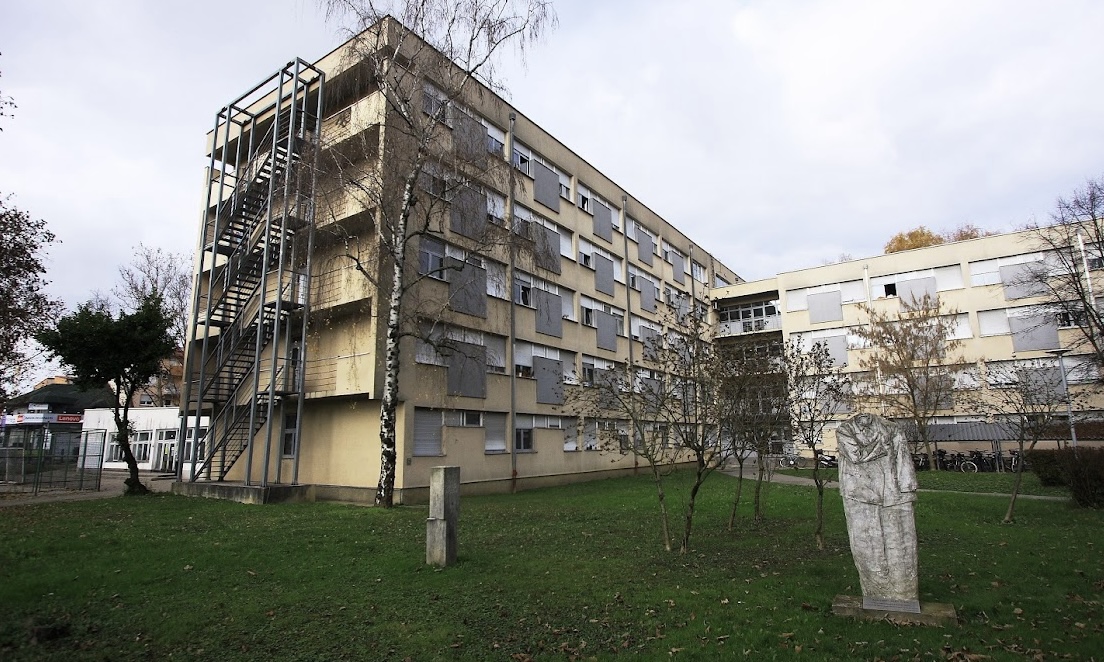
Student Accommodation Ante Starčević (Photo: Pavle Miljovski)
- Studentski Dom Stjepan Radić
Jarunska 2, 10000 Zagreb
e-mail: This email address is being protected from spambots. You need JavaScript enabled to view it.
Tel. administration: 01 45 90 801, cashier: 01 45 90 811, fax: 01 30 15 946
Manager: Boženko Ćosić, tel. 01 45 90 802
Reception / port of the student settlement: 01 4590 800; 091 4593 536
(working hours: 0 - 24h)
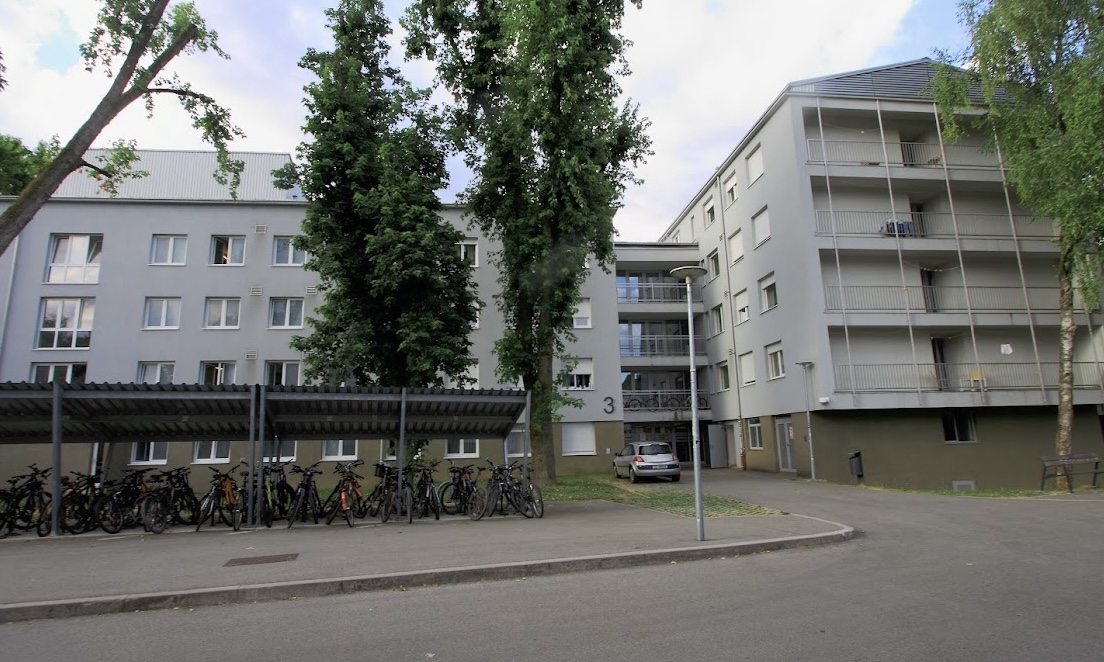
Student Accommodation Stjepan Radić (Photo: Pavle Miljovski)
Split
- Dom Kampus Dr. Franjo Tuđman
Cvite Fiskovica 3, 21000 Split
Tel: 021 / 440 - 999, fax: 021/440-958
e-mail: This email address is being protected from spambots. You need JavaScript enabled to view it. (accommodation hostess)
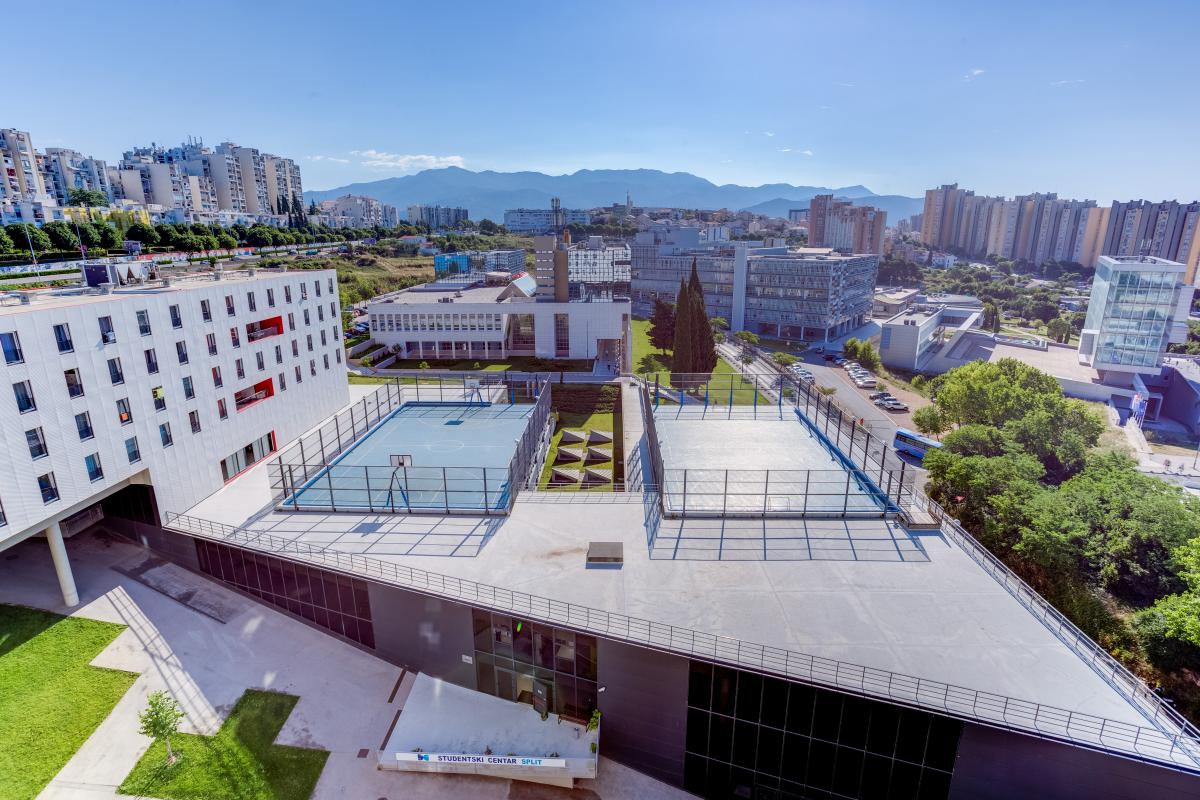
Student Accommodation Franjo Tuđman (Photo: Split Student Center)
- Studentski dom "Bruno Bušić"
Spinutska 37, 21000 Split
Tel. 021 / 510 - 850
e-mail: This email address is being protected from spambots. You need JavaScript enabled to view it.
e-mail: This email address is being protected from spambots. You need JavaScript enabled to view it.
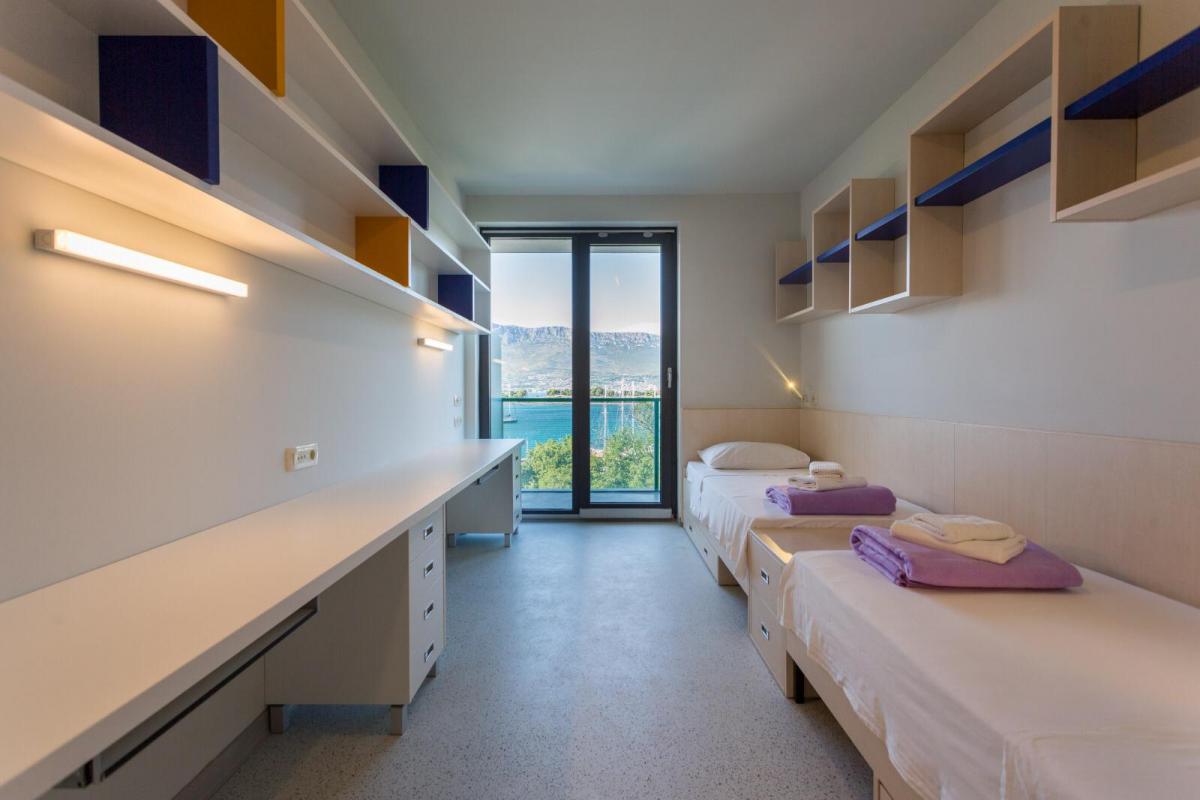
Student Accommodation Bruno Bušić (Photo: Split Student Center)
- Studenski dom Hostel Spinut
Spinutska 39, 21000 Split
Tel: 021/386-711, 021/386-733, fax: 021/386-774
e-mail: This email address is being protected from spambots. You need JavaScript enabled to view it. (receptionist)
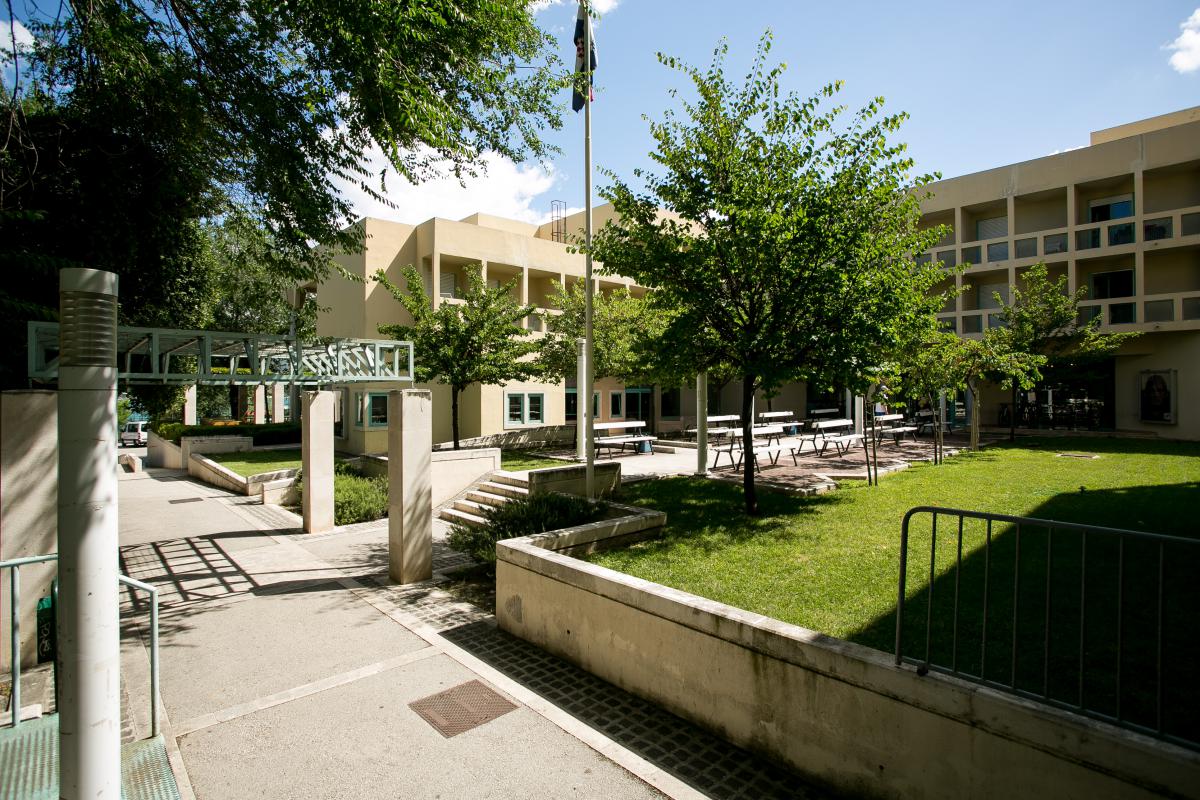
Student Accommodation Hostel Spinut (Photo: Split Student Center)
Rijeka
- Studensko Naselje ''Trsat''
Ul. Radmile Matejčić 5, 51000, Rijeka
e-mail: This email address is being protected from spambots. You need JavaScript enabled to view it. / Student Center: This email address is being protected from spambots. You need JavaScript enabled to view it.
Tel. +385 51 584 530
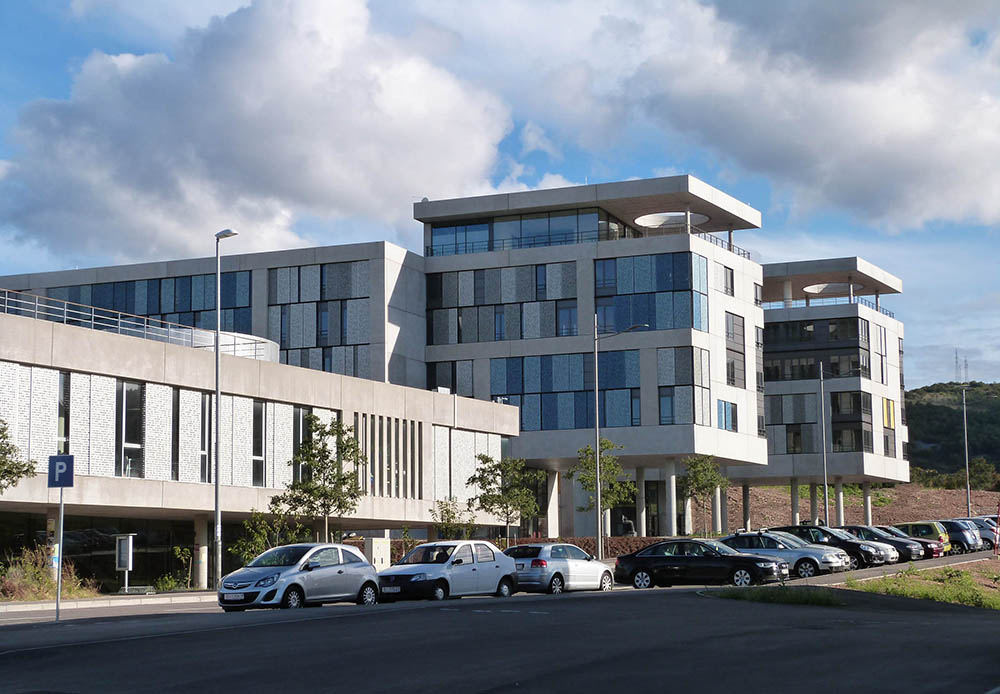
Student Accommodation Trsat (Photo: Rijeka Student Center)
Osijek
- Studentski Dom IGK
Ivana Gorana Kovačića 4, Osijek 31000
Phone: Management - (031) 574 002
Reception - (031) 574 269
Working hours of the administration: from 7-15 hours
work with clients 08-14 hours
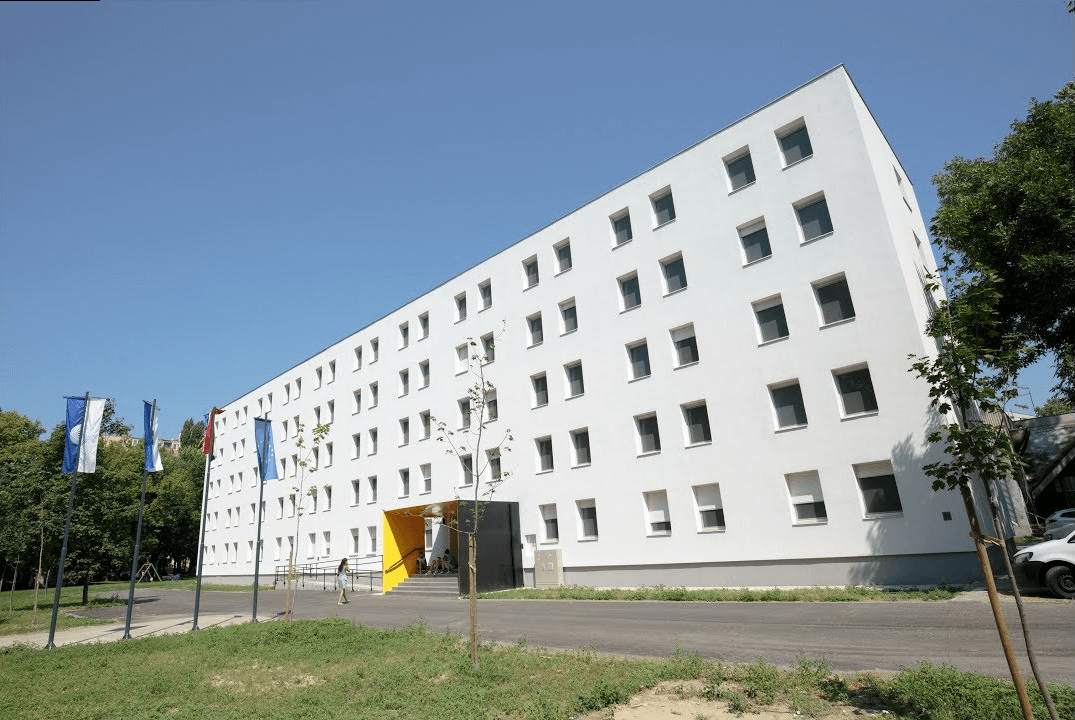
Student Accommodation IGK (Photo: Osijek Student Center)
- Studentski Dom K.P. Svačića
Kralja Petra Svačića 1C, Osijek 31000
Phone: Management - (031) 251 121
Reception - (031) 251 120
Working hours of the administration: from 7-15 hours
work with clients 08-14 hours
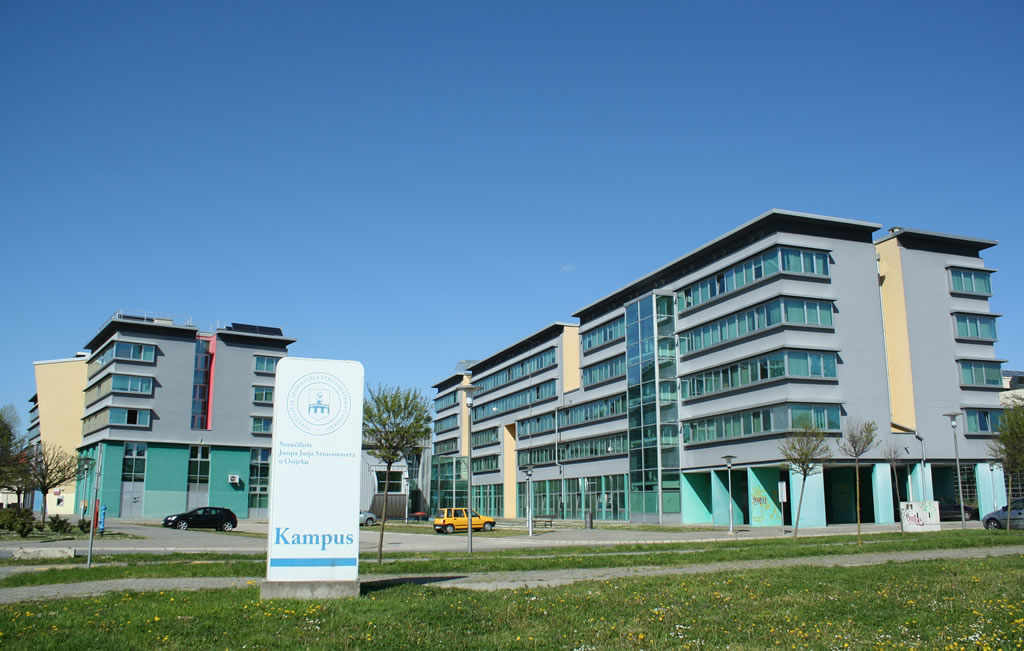
Student Accommodation K. P. Svačića (Photo: Osijek Student Center)
Do not forget to bring your medical certificate in case they have previously requested it by mail. You must also present your passport to be identified. You will be asked to fill out a form related to COVID-19 and sign a contract. Once registered, they will give you your keys and indicate your pavilion and bedroom. In some accommodations, such as in Rijeka, they will give you directions for the use of other facilities such as the laundry, gym, and library.
Note: Remember that student accommodation in Croatia CANNOT be used for self-isolation. It is also prohibited to consume alcohol or drugs inside the accommodation. Doing so may mean your expulsion from the scholarship and not being able to apply again in the future. Remember, when you come to Croatia you are a representative of your country.
5. Formally enroll in the course at the Faculty of Philosophy
Once you have checked into your accommodation and taken a good rest, go to the Faculty of Philosophy in your city, to officially enroll in the Croatian language course. In each Faculty, there is the department in charge of organizing the Croatian language course in that city, and they will provide you with the necessary information about the course, as well as some documents that will be useful to you. We recommend that you attend the Faculty early to enroll since in many cases they only work until 1:00 p.m. or 2:00 p.m.
You will have to ask them about the public transport card, and they will give you a student document and instructions to acquiring it at the public transport office in your city. Also, ask them about the WiFi, and they will give you your username and password that can be used both in the building of your Faculty, as well as in your accommodation and in various parts of the city.
Remember when I mentioned above that you organize all your documents in one folder? It would be a good idea for you to take it to the Faculty at the time of enrollment, they will surely ask for an ID and probably passport-size photos.
The Croatian language course is organized at the Faculty of Philosophy in Zagreb, Split, Rijeka and Osijek, and is conducted by the Center for Croatian as a Second and Foreign Language "Croaticum" (Zagreb), the Center for Croatian Studies in the World (Split), Rijeka Croatian School (Rijeka) and the Department of Croatian Language and Literature (Osijek).
Depending on your city, this is where you should head to:
- Zagreb: Ul. Ivana Lučića 3, 10000, Zagreb / http://www.ffzg.unizg.hr/centar / +38514092111 (On Google Maps)
- Split: Poljička cesta 35, 21000, Split / http://www.ffst.unist.hr/ / +38521386122 (On Google Maps)
- Rijeka: Sveučilišna Av 4, 51000, Rijeka / http://www.ffri.uniri.hr/ / +38551265600 (On Google Maps)
- Osijek: Ul. Lorenza Jagera 9, 31000, Osijek / https://www.ffos.unios.hr/ / +38531211400 (On Google Maps)
Note: the Croatian language scholarship includes the two subsidized meals, and for this, you will need a card that will be provided by the Central Office of the State for Croats outside the Republic of Croatia, through the Croatian language department in your Faculty. Unfortunately, it is unlikely that you will receive it on the first day or even in the first few weeks, so you will need to be patient. Eventually, it will be your teacher who will give you your card.
6. Register your address at the police station
Something essential and that depends largely on you, is to register your residence in Croatia. Although there are students with a Croatian passport, this is not an exception to do so, because in Croatia it is mandatory to have a registered residence and address, and this information does not appear in the passport. Likewise, those who do not have a passport should even more so register their residence since the duration of the course exceeds 90 days of free transit through the country as a non-EU citizen.
The Central State Office for Croats outside the Republic of Croatia, through your Croatian language department in your Faculty, will provide you with a study contract for the scholarship that you will need to bring to the police station in your city. In addition, you must bring your original passport and the accommodation contract that you were given when you check-in at your student accommodation (or in case you have stated elsewhere, a valid accommodation document or contract).
Like the meal card, the study contract can take a few weeks to be delivered, so you must be patient and, as soon as you receive it, go to the police station.
The police stations in each city are as follows:
- Zagreb: Ul. grada Vukovara 33, 10000, Zagreb (On Google Maps)
- Split: Trg Hrvatske bratske zajednice 8, 21000, Split (On Google Maps)
- Rijeka: Ul. Žrtava fašizma 3, 51000, Rijeka (On Google Maps)
- Osijek: Trg Lavoslava Ružičke 1, 31000, Osijek (On Google Maps)
For those interested in applying for their citizenship or passport, this is a vital step to achieve it, since these procedures (especially that of citizenship) can take several months, even longer than a semester of studies lasts. In addition, if you do not have a permanent or temporary residence in Croatia, the Ministry will simply reject your application. Therefore, those without a Croatian passport will have to apply for a one-year temporary residence in Croatia and to achieve this you will need to present the aforementioned documents at the police station, including the study and accommodation contract. Remember then that before applying for citizenship, you must first apply for temporary residence. Unfortunately, both cannot occur in parallel, and you must first receive the resolution of your approved temporary residence before applying for citizenship.
Note: it is highly recommended to organize yourself and be clear about where you will spend the year in which you process your citizenship. For example, if you really believe that you will spend a year in Zagreb studying the Croatian language, apply for temporary residence and your citizenship in that city. Another example is of someone who applies for a first semester to Split, and at that time they apply for temporary residence. Then, they decide to apply for a second semester in Osijek, while they wait for the resolution of their temporary residence. This is not recommended as the police consider your address to be in Split, not Osijek. This could affect obtaining your temporary residence or your citizenship.
7. Open a bank account
While opening a bank account is important in any circumstance, as a scholarship student you have an additional reason to consider it. If you stay in student accommodation, you will have to pay the cost of accommodation on a monthly basis (the amount depends on the accommodation). You should go to your accommodation office at the beginning of the month and make the payment.
"But didn't the Croatian language scholarship include free accommodation?" Yes! Compensation for accommodation will be paid to you after you submit the following documents:
- certificate from the Faculty of Philosophy on successfully completed course,
- a Žiro account agreement (not a current account), in your name, concluded with any commercial bank in the Republic of Croatia, with the indicated giro account number (IBAN),
- certificate (certificate) of the Ministry of the Interior of the Republic of Croatia (MUP) on your residence/stay in the Republic of Croatia, with the stated address of the student settlement.
- One of the attached documents should also show your personal identification number (OIB).
Once you obtain your accommodation contract, which will be given to you the day you check in at your student accommodation, take that contract along with your passport to the bank of your choice, and in addition to a current debit account, you must also request a Žiro account (pronounced: SHI-ro). At the end of the course, you must send the IBAN (account number) of your Žiro account to the Central State Office, to receive compensation for your accommodation.
Note: to open an account in a Croatian bank it is not necessary to have permanent residence in the country or Croatian citizenship. All you need is an OIB (Osobna Iskaznica Broj) identification number. If you have a Croatian passport or ID, you will find this number in either of the two. If you don't have an OIB number, you will need to get one. To find out how to obtain an OIB number, check out this Expat in Croatia guide, which includes the form to fill out and all the necessary steps. Remember that you will also need your OIB to request accommodation compensation at the end of the course.
8. Buy your study materials
To study the Croatian language you will need a learning book and an exercise book. Don't worry if you still don't have your books to study the Croatian language as soon as you arrive. Usually, your teacher will provide you with copies in the first few days, and it is he or she who you can ask where to get them. Remember that you will not be given copies for the entire semester! Most likely, your faculty has its own bookstore, where you can buy your books to study Croatian.
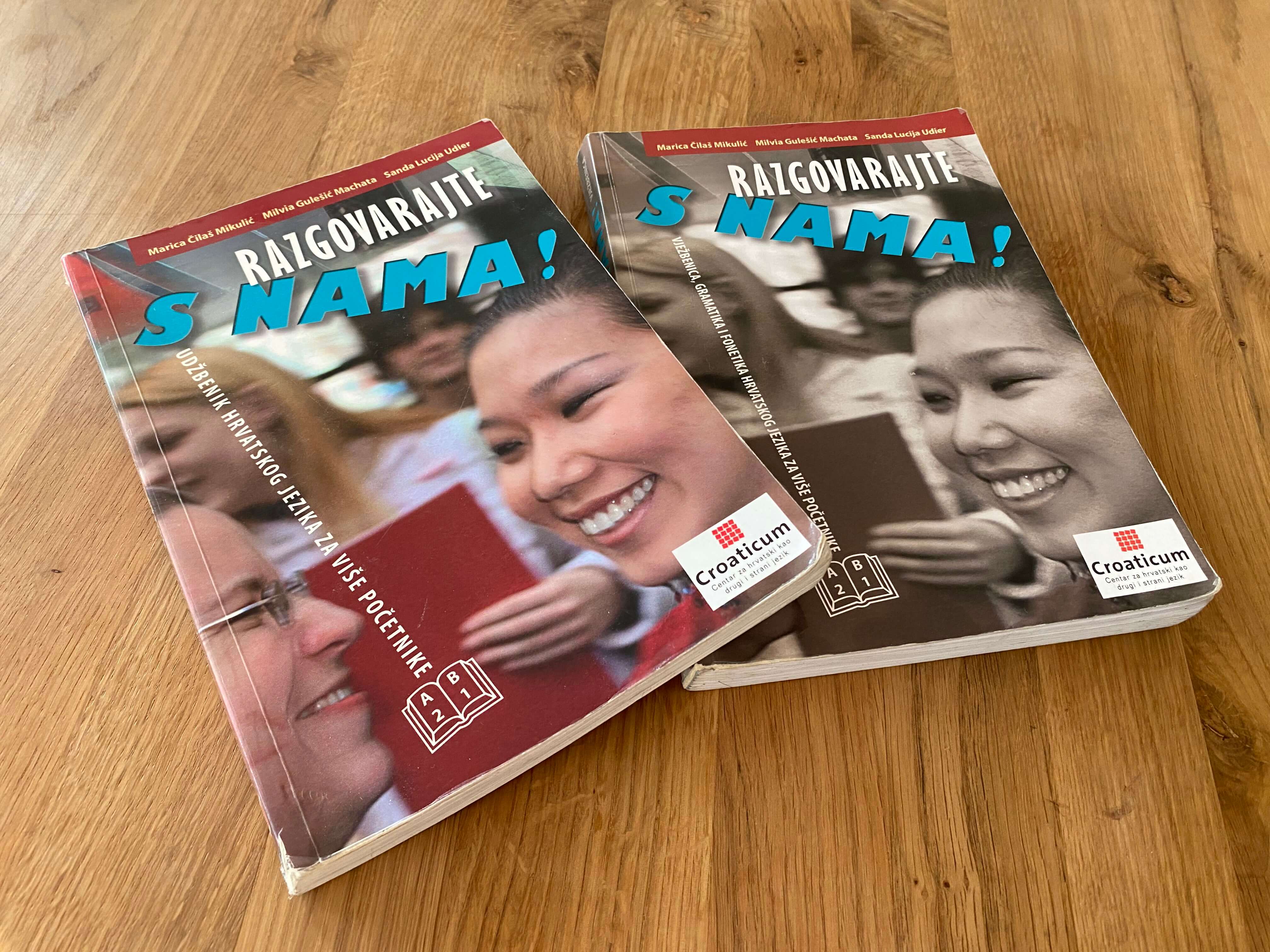
The learning book on the left, and the exercise book on the right. These books are for the A2/B1 level. (Photo: Jose Alfonso Cussianovich)
Take good care of your books, as they can be useful even after studying the course. The learning book includes a Croatian to English dictionary on the final pages, and the exercise book includes tables of contents at the end for easy review of rules for declensions, conjugations, and more.
Note: make sure that the books you buy correspond to your learning level. If this is your first time studying the Croatian language, you will most likely need to buy the A1 / A2 level books.
9. Respects health measures against COVID-19 in your accommodation and faculty
Despite the difficulties and obstacles due to the COVID-19 pandemic, the Central State Office for Croats outside the Republic of Croatia managed to develop the scholarship for the Croatian language course in the March-June 2020 semester, the semester from October 2020 to January 2021, and the semester from March-June 2021.
The only possible way to develop the Croatian course was through online learning, thus respecting the measures and restrictions imposed by the Croatian government. As the epidemiological situation began to improve over time, some faculties such as Zagreb and Split returned to face-to-face classes for the March-June semester of 2021. It should be noted that in order to develop face-to-face classes normally, the use of masks, as well as the reduction of the number of students per class, and distribution of seats in the classroom that respects social distancing.
It is expected that this year all the faculties will return to face-to-face teaching, but that means respecting, in the same way, the epidemiological measures to combat the pandemic. Masks are mandatory. Through the call made by the Central State Office in May, a special call was made to the selected students to reconsider the possibility of traveling to Croatia and that, as an alternative, they could still take the language course online from their countries.
During the study time of the course, it is recommended to avoid attending classes in case you feel fever, malaise, or cold. Notify your teacher and classmates by mail if you suspect you may have COVID-19. Take a PCR test to rule out that you have COVID-19. If it is negative, communicate with your teacher and classmates so that they are calm. If it is positive, contact the health center and your accommodation, and follow their instructions to be transferred to other facilities where you can perform isolation during your recovery. Remember, student housing cannot be used, under any circumstances, as a place for self-isolation.
In case you feel ill or feel obliged to miss class, let your teacher know in advance and you will see that it is possible to attend class online from your room.
IMPORTANT: If you have already been vaccinated, it is important that you provide this information to your accommodation when registering upon arrival. We also recommend you go to the HZZO (Croatian Health Institute) and ask for the COVID Passport, which is a QR code that will begin to be requested on a mandatory basis throughout the country to attend different events or places.
Note: If you have not yet been vaccinated and want to do so, contact the Central Office of the State, and it is very likely that they will help you get a vaccination appointment in your city.
Note: Do not forget to wear a mask in the corridors of your accommodation and faculty.
For all you need to know about coronavirus specific to Croatia, including travel, border, and quarantine rules, as well as the locations of vaccination points and testing centers across the country, make sure to bookmark our dedicated COVID-19 section and select your preferred language.
10. Get everything ready for your trip to Croatia!
Weather in Croatia
Now that you know everything you need to know before traveling to Croatia and attending your Croatian language classes, get ready for the months to come! You will surely attend the semester from October 2021 to January 2022, for which I will tell you what is the climate that awaits you in the Croatian autumn and winter.
If you attend classes in Split or Rijeka, you will find yourself in the second and third largest cities, respectively, in Croatia, and both are located on the Adriatic. In October you will find warm and sunny days where the temperature can reach up to 20 degrees, as well as cold but not icy nights, with temperatures that drop to 14 degrees. It is possible to take a dip in the sea during this month! However, it is likely that at this time of year (especially in these two cities) you will find rains, winds, and storms that begin to appear more frequently. In Zagreb, located in central Croatia, and Osijek to the east, the weather may be similar, but surely less sunny.
Starting in November you will notice that the temperatures will begin to decrease progressively (17 degrees max, 10 degrees min), and the sunny days will become less frequent. You will get used to the strong winds and rain. Already in December and January, you will start to wrap yourself more warmly against the cold temperatures both during the day and at night (5 degrees max, and temperatures can drop to -5 or -7 degrees. If you are in Zagreb or Osijek, prepare for the snow!
Therefore, we consider it essential that you bring:
A jacket to keep you warm in very low temperatures
Cotton or wool sweaters
A windbreaker that can also keep you warm
A waterproof jacket for the rain
Leg warmers
Warm socks
Winter pajamas
Waterproof boots (you can ruin your white sneakers in puddles caused by rain)
Winter gloves
Hats for the cold
Umbrella (very important!)
Sunglasses (despite the low temperatures, there can still be very sunny days and the sunlight bouncing off the marbles of Diocletian's Palace in Split could leave you blind!)
In the winter months, the student accommodation turns on the heat in the student rooms. We recommend that you check this at the offices of your accommodation since in some cases it is necessary to confirm that you expressly wish to do so.
If you applied for two semesters or plan to apply for a second one while attending the first one, then you'll expect hotter months from May to June. But don't worry, you'll have enough time to buy some shorts, swim trunks, or sandals. My suggestion? Travel light! Clothes prices in Croatia are great, so you can travel with what you really need and search for whatever you might need later here.
To learn more about the weather in Croatia, visit the complete Total Croatia guide.
In case you find yourself caught in a rain or storm in Croatia, read this interesting page from Total Croatia on what to do while it rains in Croatia.
Currency in Croatia
Regarding the currency, remember that in Croatia the Euro is not used, but rather the Kuna. In addition, it is very likely that in several places they will ask you to use cash and not a card. If you arrive at the airport, we recommend that you change only a little of your money there to move to the city. It is preferable that you exchange your euros or dollars at an exchange office in the city, where the prices are better.
To give you an idea, one euro is equivalent to 7 kunas. While a dollar is equivalent to 6 kunas.
The expenses during your stay may vary depending on the city, but with some approximate ones, you could calculate what you will need monthly:
- 100 kunas per month to cover public transport
- 105 kuna per month to cover your meal (using the card for the two subsidized meals)
- 120 kuna per month for laundry (once a week, 30 kuna)
- 540 kunas per month to pay for accommodation (in Zagreb the amount is 300 kuna, but we have put the most expensive in Rijeka as a reference)
- 150 kuna per month to pay for an unlimited data plan on your phone with Telemach
- 2000 kuna for extra expenses (food, clothing, movie tickets, taxis, travel, etc)
In total, you may need approximately 3815 kuna or 450 euros to cover some monthly expenses.
For more information about currency in Croatia, visit Total Croatia 's complete guide.
Transport in Croatia
Depending on your city, you will notice that public transport is different. If you are lucky, it is likely that you will quickly become familiar with the routes and bus stops in your city, but most likely at first you will miss a stop or get lost. Don't worry, the four cities have very well organized transport systems and, if you make a mistake, you will see that you will be able to orient yourself again.
In Zagreb, the city has a transportation system that includes tram and bus routes. You can get to any part of the Croatian capital in both. You should make sure you have a balance on your public transport card, and remember that at the beginning of the month you will have to recharge it at a Tisak or at the Zagreb Public Transport (ZET) office, as it cannot be accumulated between different months. Another alternative is to buy 4 kuna tickets in a Tisak, which you can use to make two trips within 30 minutes on both the tram and the bus. You can also buy the ticket from the driver, but this will cost you 6 kuna.
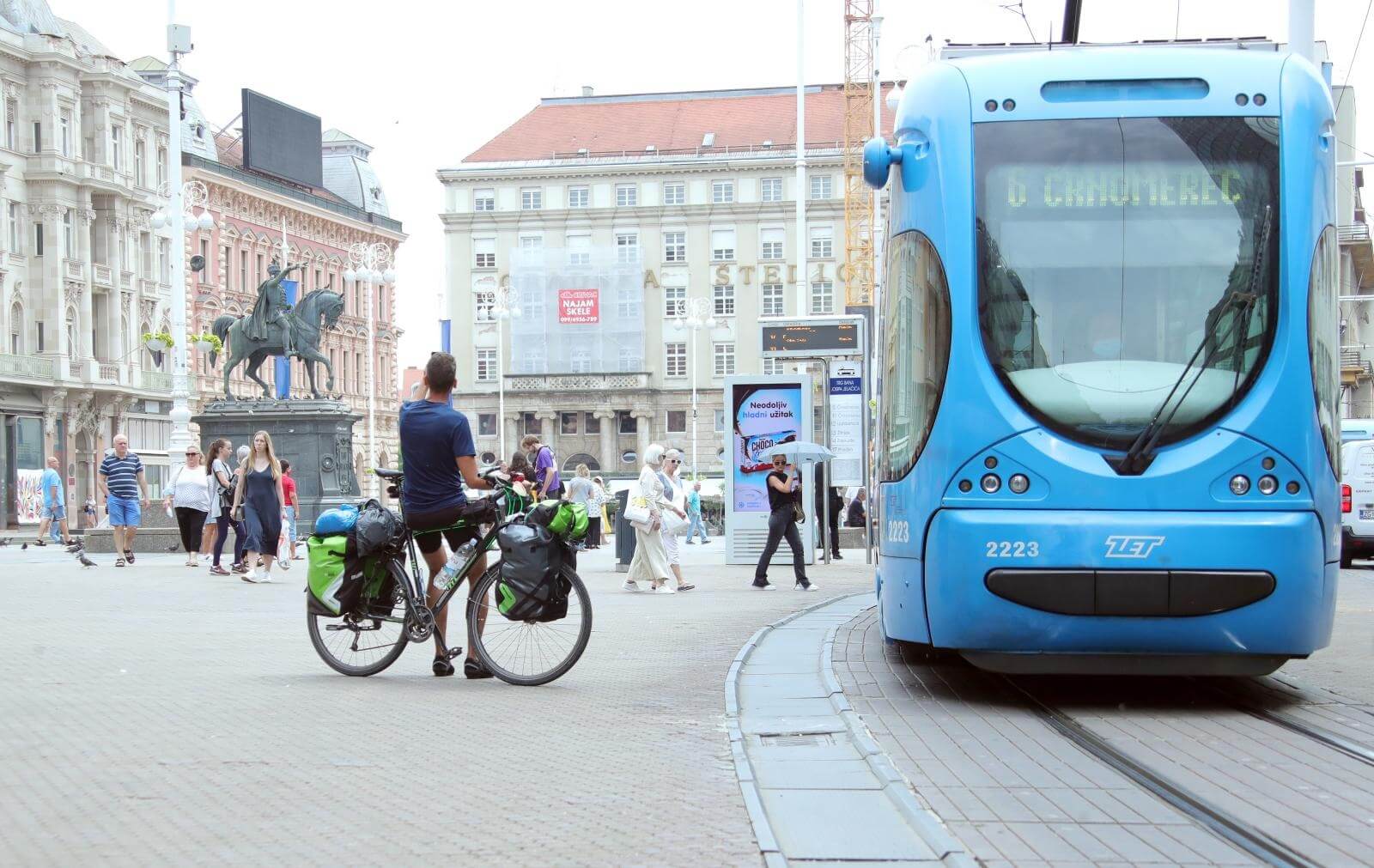
The Zagreb trams at the Ban Josip Jelačić square (Photo: Sanjin Strukic/PIXSELL)
In Rijeka, the city has a bus system called Autotrolej that connects the city. As in Zagreb, you will need to get your public transport card to move from Trsat (where your accommodation and classes are) to the center and vice versa. In this city, it is highly recommended to have the card, since the largest number of shops and restaurants are in the center, and to return to Trsat you have to walk a lot and through steep streets, which in these times can become streams of water with storms and rains. The buses that take you to and from Trsat are lines 2, 7a, and 8. If you want to buy the ticket from a Tisak or from the driver, it will cost you 10 kuna if you travel from Trsat to the center of Rijeka and vice versa.
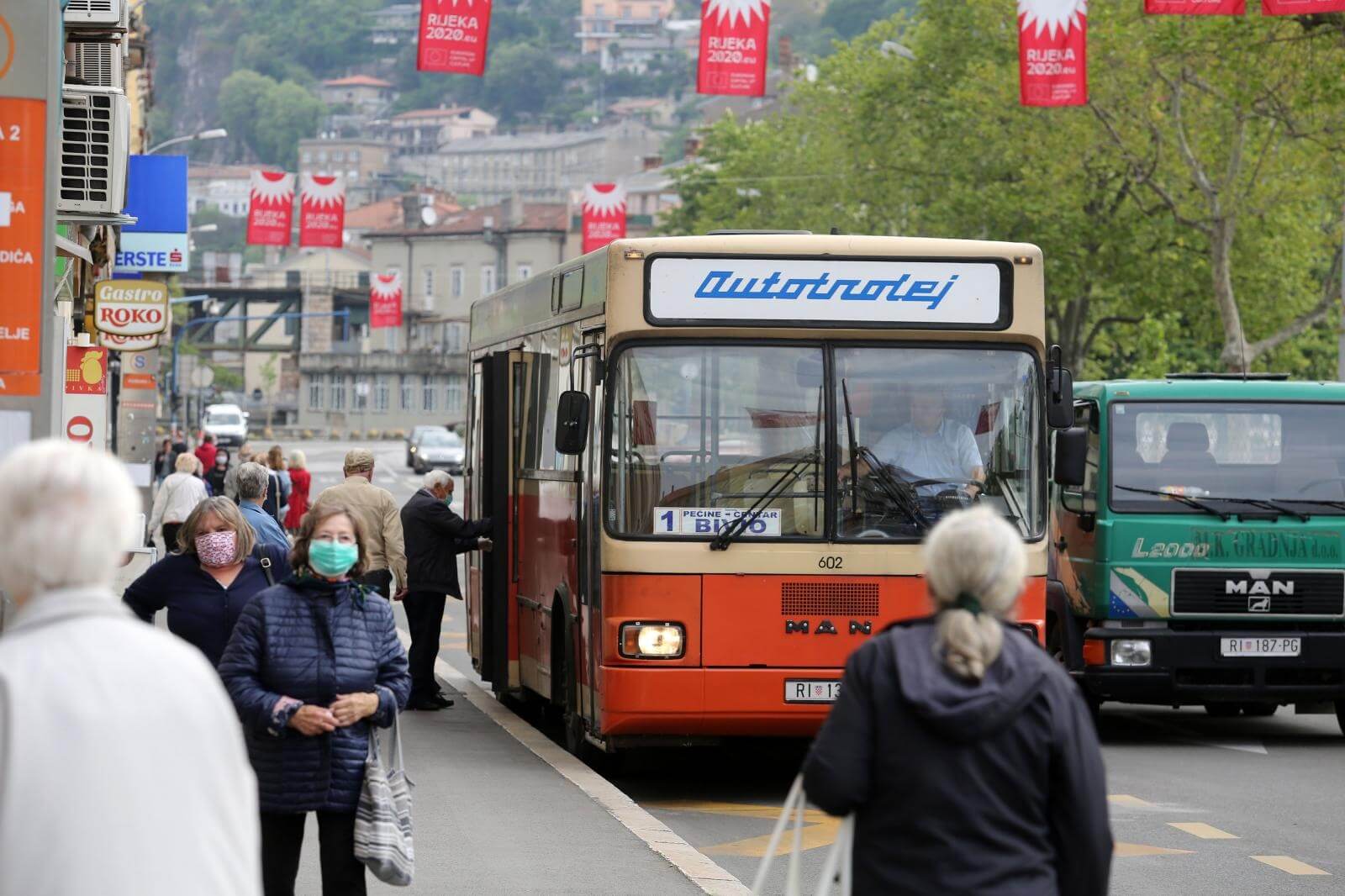
The buses in Rijeka (Photo: Goran Kovacic/PIXSELL)
In Split, as in Rijeka, you will find a network of buses that runs through the different areas of the center and the outskirts. Split public transportation company is called Promet Split. For detailed maps of their city and suburban lines, as well as ticket prices, check out their official website. Most of the locations within Split fall into Zone 1 in the company’s price list. Zone 1 tickets for a single ride cost 9kn when bought on Tisak, 11kn when bought on the bus. The daily ticket is 30kn.
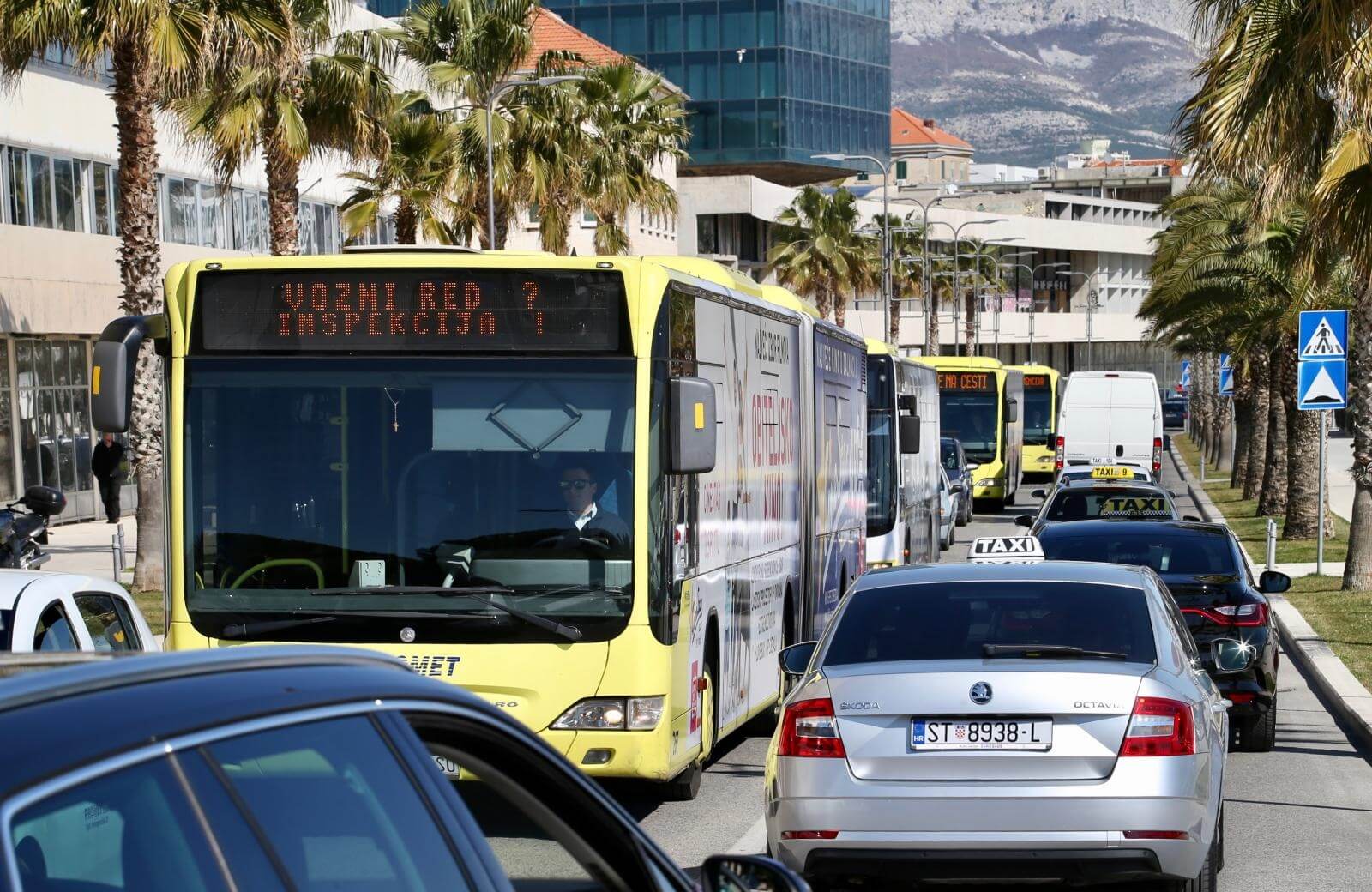
The buses in Split (Ivo Cagalj/PIXSELL)
Osijek was the first city in Croatia to have a tram system. In fact, trams still run through the city: it’s the only place in Croatia outside Zagreb that has trams. Osijek is a very pleasant city to walk around. Indeed, you can walk between all of the city’s key areas without barely leaving fantastic park ground. And we recommend you do just that. However, Osijek is also nicely covered by public transportation. In this case, that means cheap local buses and trams. Additionally, there are well-priced taxi services. It costs only around 20 kn to travel anywhere in the city (within 5 km).
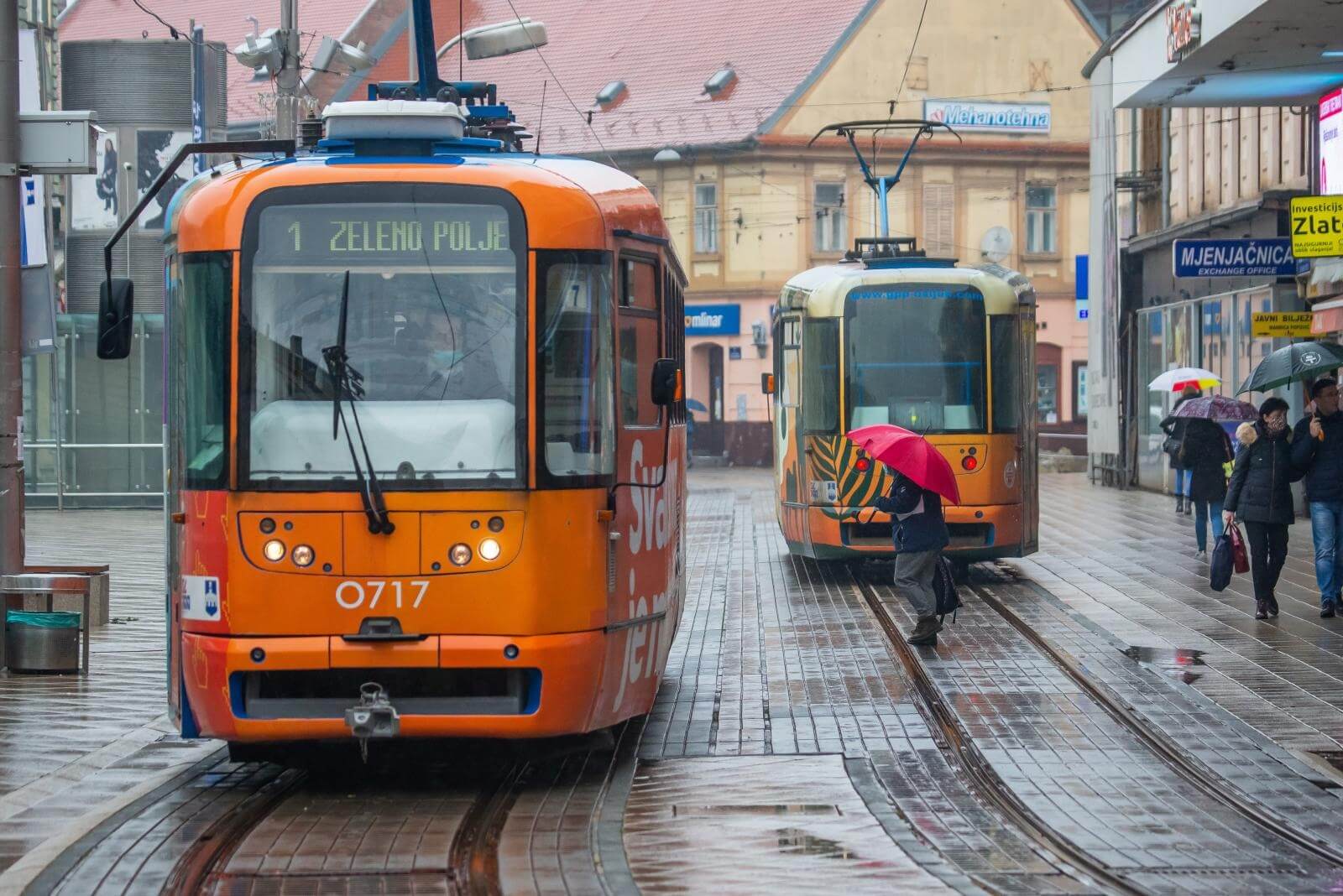
The trams in Osijek (Davor Javorovic/PIXSELL)
Not only will you find that it is easy to move from one place to another in the city, but that you will also be able to travel to all destinations in the country through buses and trains. If you're familiar with Uber, you'll be able to catch one anywhere in your city and even at late hours. Other options for Taxis are Cammeo and Bolt.
Health in Croatia
You will most likely arrive in Croatia with international health or travel insurance. Make sure you bring the necessary documentation related to that insurance. In case you need a consultation with a specialist or have to go to emergencies, contact your insurance before and after to cover the expenses. Medical receipts for those who are not enrolled with insurance can be ruthless. In addition, in pharmacies, it is essential to present a prescription to obtain your medications. A doctor assigned by your travel insurance can fill this prescription and mail it to you.
In case you are interested in public health insurance, especially if you wish to stay for a longer period of time even after the course ends, health insurance in Croatia is mandatory for all those who have temporary or permanent residence in the country, both ones with Croatian citizenship and foreigners. If you have an OIB, you can apply for Croatian health insurance. Check with the HZZO (Croatian Health Institute) offices if Croatian health insurance is right for you or if you are eligible. In the most likely case, you will have to pay the equivalent of the previous year to enroll, and you must not be affiliated with private or public insurance in your country of origin. Once enrolled, you will have to pay 500 kuna per month that will allow you to access prescribed medications, medical consultations, and cover expenses in the emergency room. Also, you will need to register with a GP.
To learn more about the healthcare system in Croatia, visit this guide from Total Croatia, where you will find information about specialists (some of them that speak in English), emergency numbers, hospitals, and insurance.
If you'd like to have emergency contact numbers handy, check out this Total Croatia page.
To learn more about Zagreb, such as places to see, things to do, museums, restaurants, bars, cafes, public transport, fun facts, events, and more, visit their Total Croatia page.
To learn more about Split, such as places to see, things to do, museums, restaurants, bars, cafes, public transport, ferry, fun facts, events, and more, visit their Total Croatia page.
To learn more about Rijeka, such as places to see, things to do, museums, restaurants, bars, cafes, public transport, ferry, fun facts, events, and more, visit their Total Croatia page.
To learn more about Osijek, such as places to see, things to do, museums, restaurants, bars, cafes, public transport, fun facts, events, and more, visit their Total Croatia page.
To find out more about what you need to know about Croatia, how to get around the country, destinations you can visit during your stay, and things you can do and see in these months, visit www.total-croatia.com, available in your language!
If you wish to learn more or have any questions about the Croatian language scholarship given by the Central State Office for Croats Outside the Republic of Croatia to study the Croatian Language in Croatia, send me an email to This email address is being protected from spambots. You need JavaScript enabled to view it.
Spanish Party Team in Split: Spanish Youth Tries the Croatian Coast
June 2, 2021 - One TCN intern spoke to three people from different regions in Spain about their expat experience in Split.
Croatia is an easy county to adapt to Spaniards because they don't really need to adapt a lot. The climate is similar on the Mediterranean coast and the culture has a common Catholic base. Meanwhile, it's not the same thing and they value their experience from living in Dalmatia.
My Croatian boss told me about his mate, a Split journalist, who once wrote that the best city in the world was... not Split, but San Sebastian located in the Basque Country, Spain. It represents a flagrant case, but in general, as I can see, many Split citizens have the positive impression of Spain - either through business trips, or holidays there, or the Camino - and wouldn't mind moving there for some period of time. I spoke with my Spanish colleagues in Split who have done the opposite move and asked them to compare their life in Spain and in Croatia. They came from different regions of Spain: Estela (28) is from the north-west region of Galicia, Pablo (24) is from the Saragosa, the capital of the north-east region of Aragon, and Jorge (25) is from the south-east region of Murcia.
Jamon or pršut?
"In the cuisine, there are many similarities because of common ingredients of Mediterranian cuisine," Pablo starts and enumerates some of it as olive oil, cheese, vegetables. Some foodstuff is more popular for one region than for others. For example, a homemade meal in Saragosa usually contains dishes with green beans, while in Split, it's difficult to find fresh green beans to cook with at home. In Galicia, people traditionally eat more liquid food or soups, while Dalmatians prefer solid foods like pašticada. 'Ajvar' sauce from red pepper is popular in the Balkans and would probably never become a part of Spaniards’ nutrition if they had not moved to Croatia.
Some differences in nutrition arise from the geographical circumstances, for instance, seafood is more typical for coastal sides of Spain as well as Croatia. Dorada fish is bigger in Galicia in the cold waters of the Atlantic than in Dalmatia in the Mediterranean Sea. Other distinctions stem mostly from the generational gap and personal circumstances. Young generations try to keep healthy nutrition with less meat and more fish in spite of the geographical region they live in. Estela feels closer to this generation than to the older one that cannot imagine the main dish without meat, either in Spain or in Croatia.
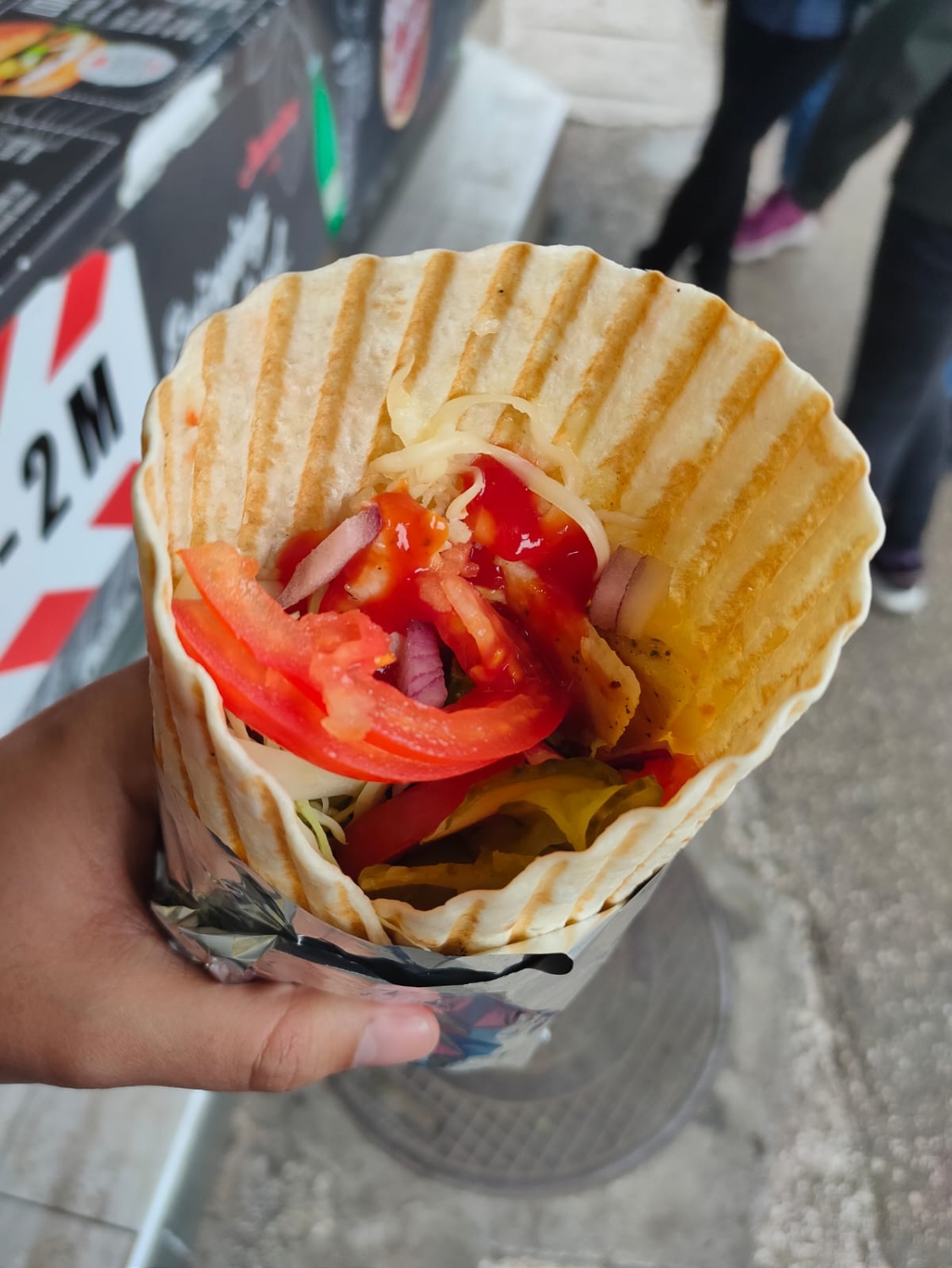
Jorge was surprised by the level of prices in the supermarkets here. It's more or less the same as in Spain, whereas the level of salaries is certainly lower in Croatia. He also misses big chain supermarkets in Croatia like 'Merkadona' in Spain, because it produces some foodstuff under its own brand. Things like 'guacamole' or 'hummus' have a good quality there. However, in Split, there are a lot of products imported from Spain, like 'Lidl' supermarkets with its 'Spanish week', etc. Maybe, you won't find some small local brands of cheese or beer that you're used to in Spain, but you will find an adequate substitution. Looking closer, ‘pršut' is similar to 'jamon', 'kulen' is similar to 'chorizo’, and the like.
Coffee or beer?
Choosing between coffee and beer depends on the time and day schedule for Spaniards. They feel more streamlined in this matter. Breakfast should be before you go to work. A lunch is between 2:00 and 3:00 pm, and dinner is served between 9:00 and 10:00 pm. "In Croatia, people eat when they want!" Pablo and Estela wonder. "Here, people drink more coffee", Estela continues. In Spain, it's normal to have coffee first with your breakfast, to drink one more in the afternoon, and perhaps to have one more coffee after lunch. People usually drink their last coffee at lunchtime, but not at 8:00 pm as people do in Split. Of course, there are some people in Spain who have to work in the evening or have other reasons to drink coffee so late, but most Spaniards prefer beer in the evening.
The culture around having coffee or beer in some public places does not differentiate much. You can enjoy one cup of coffee in a cafe for hours if you're not in a hurry. You can drink coffee quickly and go to work as well. It's typical to have a beer in the evening as people usually finish work, but it's ok to have it even at 1:00 pm as you've already finished your business. Coffee in cafes is a little more expensive than in Spain. Prices for beer in Split bar are also higher, as Jorge and Pablo guess. Estela makes adjustments. A mug of beer is bigger here, and accordingly, the price is higher. In sum, we have more or less the same level of prices in Croatia and in Spain. Also, Split is the second-largest city in Croatia and a tourist city, namely the ‘Croatian Barcelona’. Certainly, in the historic center of Barcelona, a glass of beer costs more money than in some towns in Galicia.
The variety of coffee is broader in Spain. For example, 'cortado' most likely won’t be found in any cafe in Split. Spaniards agree that the quality of coffee is good. Meanwhile, they prefer coffee from the machine or an Italian drip kettle. "Turkish coffee is kind of disgusting to everybody who gets used to Italian coffee," Jorge supposes. A beer in Croatia is less strong than in Spain, however as mentioned, a normal glass or a bottle is 0,5 l instead of 0,33 l. You get less alcohol with a bigger amount. At will, you can get the same thing in Spain. There, if a beer is too strong, people dilute it with sparkling water or lemon juice. In Croatia, nobody does that. But Croatians often dilute wine with sparkling water or ice that seems weird to Spaniards. "If wine is really bad, we do 'sangria' or 'calimontxo' (namely Croatian 'bambus') from it. If wine is good, we never mix it. People would ask why?!” Estela explains to me.
Inside or outside?
Estela and Pablo arrived in Split in late November 2020, a week before the second anti-Covid lockdown. Jorge came in March 2021, a week after cafes and terraces started to re-open after winter quarantine. One might think that Jorge was luckier to come later, but in fact, the Covid restrictions were stronger in Spain than in Croatia. In any case, their experience in leisure time had objective limits because of the Covid-19 pandemic. It's difficult to compare entertainment in your home town and in Split, they say because they haven't seen that touristic crowded loud Split as it was before the quarantine. However, nobody really suffered from the lack of activities here.
Pablo says that when you come for a year, you're more concentrated on the communication with new people you meet here. He was not striving to go to a gym or wherever for any organised leisure time. "I'm not bored now. If I lived here for a longer period of time and had a routine every day, I would probably try. I mean there are some museums, etc." Pablo speculates. Indeed, in this sphere of communication, we were lucky in Split. There are some typical public places for drinking in the afternoon or evening time in every town of Spain, but this kind of social activity is prohibited and the police usually come. Otherwise, Matejuška pier situated on the edge of the Split Riva is open 24h and rarely visited by the police. You can go there almost any time to drink in a company and meet amazing people from all over the world.
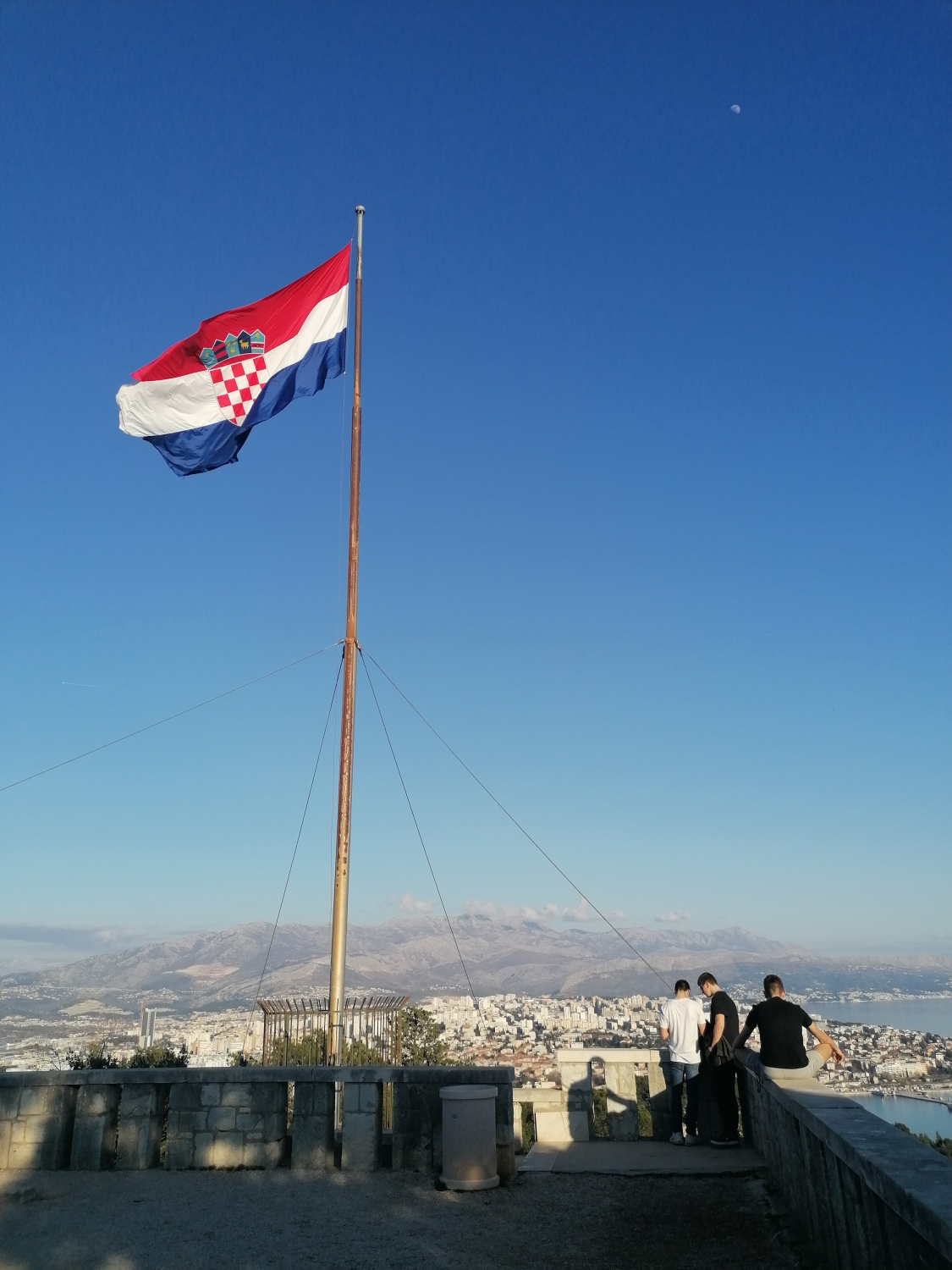
We met people on Matejuška even on the coldest evenings in winter. As a whole, there are fewer activities during the winter and more in summer. Leisure time options in Split are similar to Ferrol, Estela says. As well she prefers to spend leisure time outside. You can go hiking in the mountains or swimming in the sea - fortunately, both options are close to the city. If you fancy it, it doesn't take much time to come by foot to some beautiful nature place in the surrounding area. Split is situated on the hills, nevertheless, the Riva promenade is straight enough for roller-skating and skateboarding. With her friend, Estela found a good place for skating behind the ferry port of Split. Besides roller skates, she also took a slackline and was pleasantly surprised to find another group of slackliners in the city park Sustipan.
They went once to the cinema and theater. In the cinema, it was an American movie - an original version with Croatian subtitles. The fact that cinemas usually show original versions is for sure appreciated by Spaniards. In Spain, movies are mostly dubbed, thus foreigners have little chance to understand the plot. What is even more pleasant, as Estela's local friend shared with her, the summer cinema on Bačvice beach will be showed with double - Croatian and English - subtitles, so foreigners will have all the options.
To speak or not to speak?
My Spanish colleagues as well as I came to Croatia through an international program that affected our community. Almost from the first month, we joined the Facebook group 'Expats meet Split' and it also affected the international diversity of our social circle. Estela speculates: "If I had an ordinary work here, in a public school, for example, perhaps I would have more Croatian friends, and it would be easier to do at the workplace". But anyway, she considers Croats are very open to communication and their way of socialising similar to Spaniards. Croatians are open to suggestions to have coffee together, to go to the beach, to drink a beer in a bar.
Pablo has a more skeptical view of making friends with Croatians. He agrees that Croatians are open people, however, his experience of watching football in the company of Croats suggests that he needed to speak Croatian to have a true Croatian friend. They are nice, they invite you to watch a match together, but finally, they start speaking Croatian to each other and you're out of it, Pablo explains. Estela objects to him. "People of our generation, they speak good English. Of course, if you're in a big company, it'd be better to speak Croatian. If you're in a small company or one-on-one, you would not have problems socialising. You can communicate, speak, explain..."
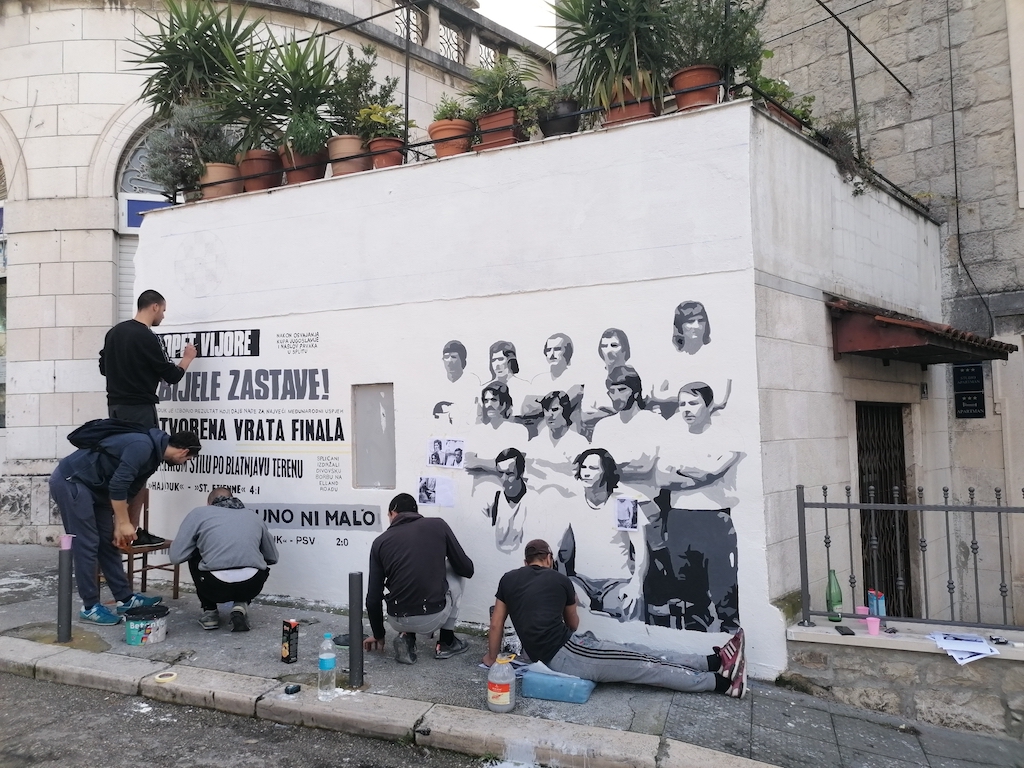
Learning Croatian is a challenge for people from Spain. The grammar is complicated. There is just a little intersection with Latin, therefore you need to learn totally new vocabulary. There are some words without vocals ('krv' blood, 'prst' finger, etc.) which is difficult to spell, some words with sounds missing in the Spanish language which is also difficult to spell ('ljubav' love, 'izviđači' scouts). Some usual words in Croatian sound funny to Spaniards, because it sounds similar to obscene words (‘koliko puta..." how many times...). Certainly, it would take years to learn Croatian properly. So far, my Spanish colleagues in Split speak mostly English and use a dozen of Croatian phrases on occasion.
Spanish people are everywhere. If you want to find them, you'll find them. However, my Spanish colleagues don't really try to find their countrymen. Jorge shies away from the Erasmus students' society that is kinda well-staffed by Spanish students in the University of Split. Pablo's first preference was an international party, but now he doesn't care whether he will join an international or Spanish party the next evening. Estela said that she tried to avoid Spanish society. "If they start talking with me, of course, I talk... If we are in a big company, I try to move to an international circle... I have enough Spanish friends in Spain."
Pomalo or even more pomalo
As we seek to describe the culture of a region by one word, we likely use 'pomalo' for Dalmatia. In the Dalmatian dialect it means 'take it easy', 'relax', 'slow down', 'put it off until tomorrow, 'we will do it tomorrow, 'we can do it tomorrow... or later'. The Spanish word 'mañana' (tomorrow) has quite a similar context to it. In Europe, these concepts are traditionally associated with southern sloths and laziness. "Europe has a stereotype of us that we are really pomalo, but here there's even more pomalo," Estela shares her impression. Pablo echos her: "Here everybody is so relaxed. It doesn't matter whether you come on Monday morning, or Tuesday morning, the Riva is full of people. And these people are not only tourists!" It looks like nobody works in this city!
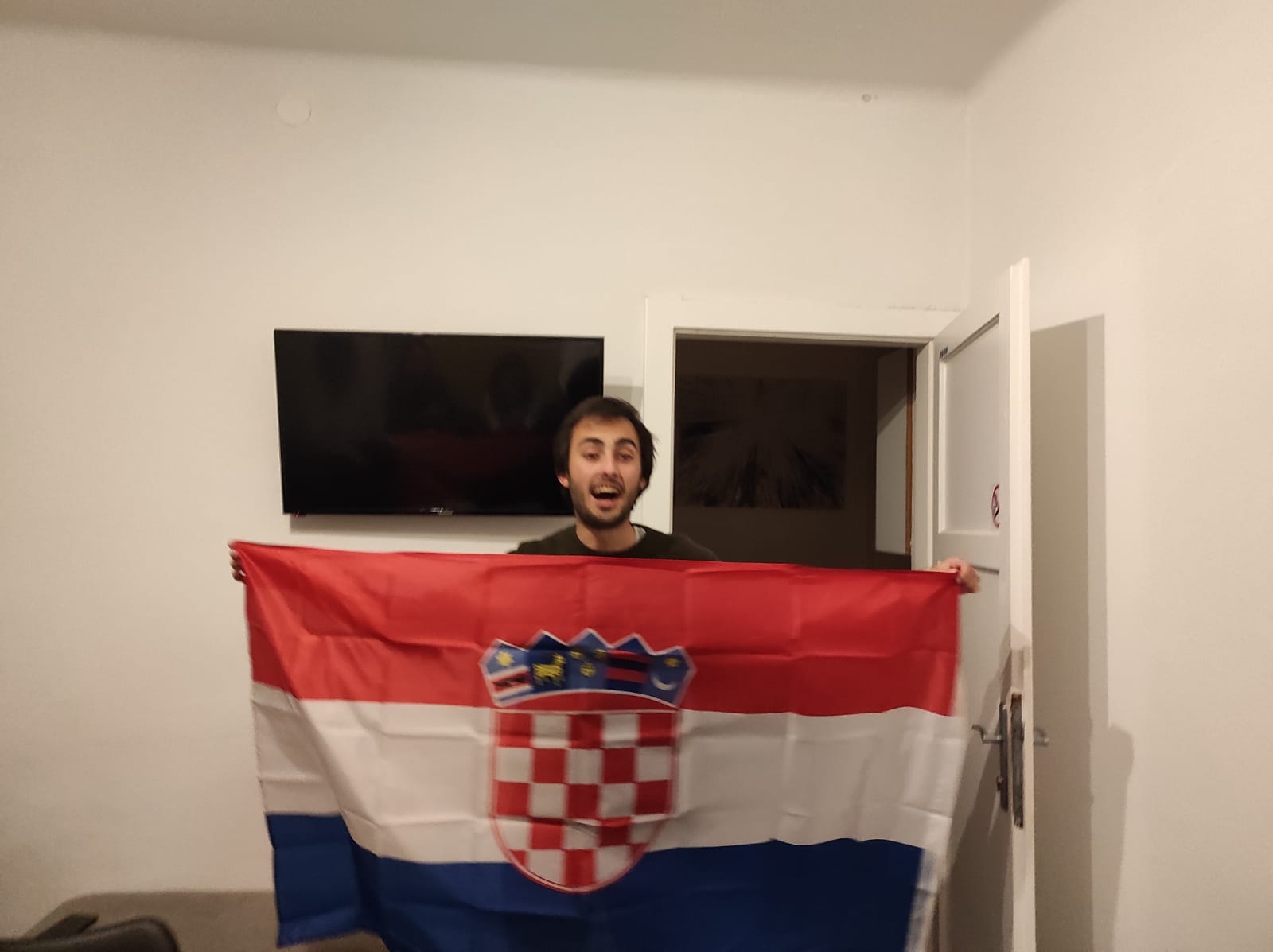
Joking aside, some manifestations of this pomalo mentality at times frustrates my Spanish team. Estela chooses her words to be merciful with our lovely Dalmatia - flexible, not disorganised. Notwithstanding, she would like to see fewer last-minute moves and more long-term plans. Maybe, slowly, but it should come to its objective. The illustrative example is local services. Croatian Post works really slow. Sending something from Spain takes about a month, but in the end, reaches the consignee. One of the bottles was broken, but when they contacted the Croatian Post service, they promised to manage it. Meanwhile, postcards that Estela's mom had sent her via post never came to Split.
Another story has happened with my colleagues during the use of the 'e-bike' service in Split. They bought an annual Croatia subscription in Zadar and should not be charged more. But the bike company began to charge them more for rentals in Split. After e-mailing, the Spanish expats learned that Split (a big tourist city, for economical reasons) and Jastrebarsko (a small town, for a random reason) are excluded from the whole-country subscription. The company returned the money and they changed the subscription to Split only. So, services work, although slowly, whereas you should make contacts and push them, and remind them, but finally, a responsible person helps you, and you get a result. So, you can manage. But, it'd be better to feel more secure from the beginning, wouldn't it?
For more about lifestyle in Croatia, follow TCN's dedicated page.
Croaticum Croatian Language and Culture Summer School Announced for 2021
May 13, 2021 - Croaticum has announced this year's Croatian Language and Culture Summer School in the city of Zagreb, and enrollments will begin on May 24th!
The Croatian language and culture are beginning to generate more and more interest among not only ex-pats who wish to return home or reconnect with their relatives, but also among tourists and foreigners. In recent years, an increasing number of people have enrolled to study the Croatian language and culture in different cities of the country. One of these departments, the Croaticum in Zagreb, has announced the opening of its summer school for the Croatian language and culture, to be held between June and July.
Despite being a real challenge, those interested this year in learning the Croatian language and culture course are encouraged to take it online, in order to achieve an approach to the rich Croatian culture from almost anywhere in the world.
The Centre for Croatian as a Second and Foreign Language, also known as Croaticum, is the oldest and largest institution engaged in teaching, research, and description of Croatian as a second and foreign language. It is part of the Department of Croatian Language and Literature at the Faculty of Humanities and Social Sciences of the University of Zagreb, the largest Croatian academic institution specializing in social studies and humanities. Croaticum is renowned for its tradition, expertise, and knowledge.
One of the main attractions of studying through Croaticum is the opportunity of being part of classes that are organized in diverse groups of students speaking different languages and belonging to different nationalities and age groups. Groups are formed on the basis of the results of Croatian language placement tests.
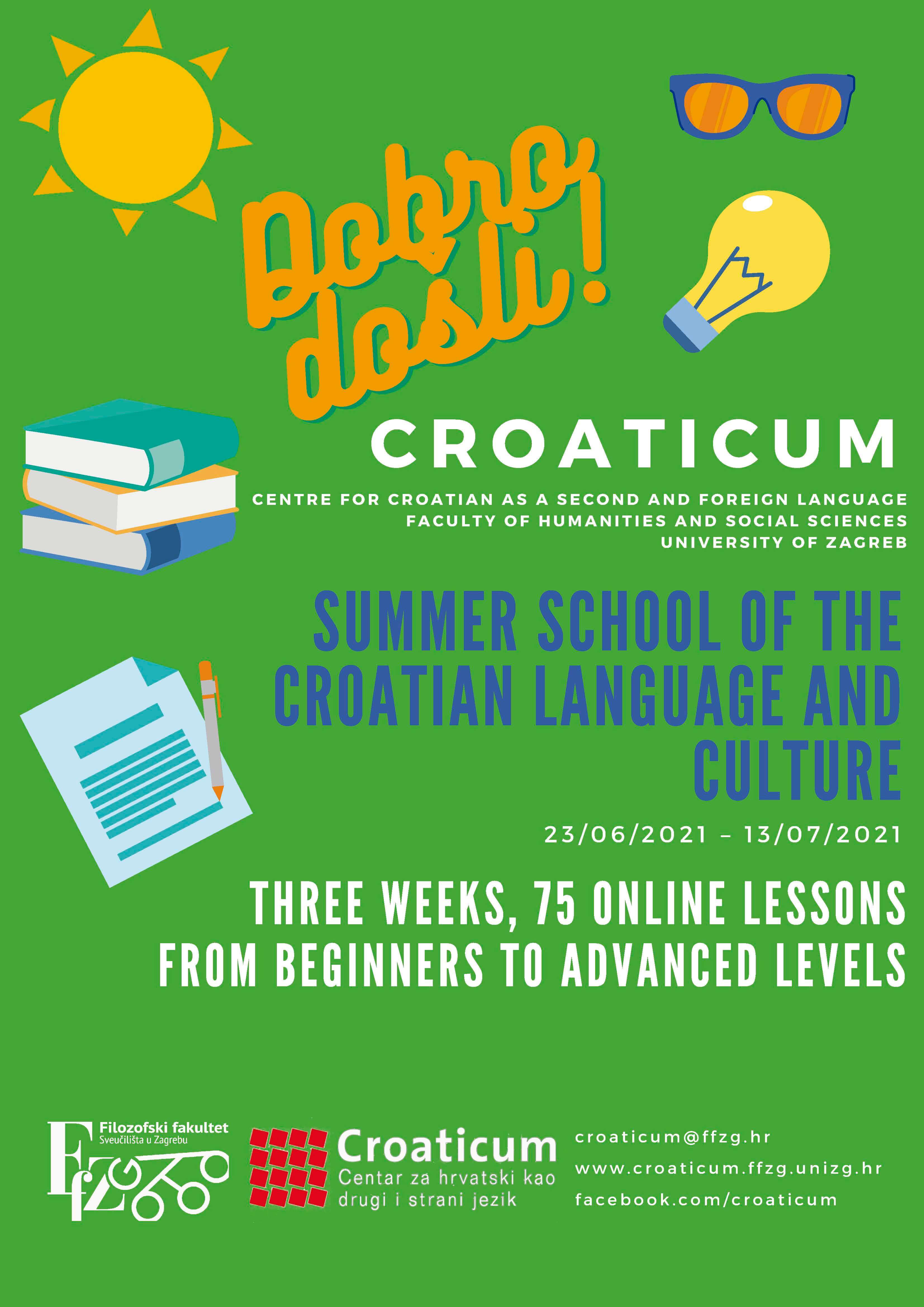
For this year, Croaticum has announced that their online Summer School of Croatian Language and Culture will take place from June 23rd to July 13th. The course consists of 75 lessons during three weeks, and they are distributed as follows:
- 60 lessons of language exercises,
- 6 lessons of phonetic exercises,
- and 9 lessons on cultural lectures and activities.
Lessons will be taught in the afternoon hours, starting from 2:00 pm Zagreb time (UTC +2, CEST).
The price of the course is 450 euros and enrollments are open from the 24th of May until the 18th of June. For online participation in the Croaticum Summer School of the Croatian Language and Culture a computer with a stable internet connection, microphone and camera is needed.
For more information on the Croaticum Summer School of Croatian Language and Culture, please check out their website.
If you are interested in the program, contact Croaticum for more details or you can fill out the online application form and you will receive an e-mail with more information when enrollments open.
You can also contact the Croaticum through phone (+385 1 4092 068), by email (This email address is being protected from spambots. You need JavaScript enabled to view it.), or through their official Facebook page.
For more, follow our lifestyle section.
Minority Leaders Push for Introducing Croatian as Official Language in Vojvodina
ZAGREB, 6 March, 2021 - The Croatian National Council (HNV) leader Jasna Vojnić has sent a proposal to Serbia's President Aleksandar Vučić that the language of the ethnic Croatian minority should be recognised as an official language in the whole territory of the northern province of Vojvodina.
The HNV web portal reported on Friday evening about this initiative launched by the leadership of ethnic Croats in Serbia in response to the plans of the local authorities in the northern Vojvodina city of Subotica to approve the official use of the Bunjevački vernacular spoken by members of a local community who identify themselves as non-Croat Bunjevci.
Under the current law, local government units must grant the official use of an ethnic minority's language and script if that minority accounts for at least 15% of the local population. According to the 2011 census, 13,553 citizens, or 9.57% of Subotica residents, identify themselves as Bunjevci.
Despite the fact that the size of the Bunjevci community did not reach the 15% share in the population requirement and despite the fact that this vernacular does not have a status of a language according to linguistic standards, Subotica Mayor Stevan Bakić of Serbian President Aleksandar Vučić's Serbian Progressive Party (SNS) moved a proposal to amend the city's statute to introduce the Bunjevac dialect and script as an official language.
The HNV leader Vojnić says that being encouraged by this example of such positive discrimination which is applied in the case of the Bunjevci community, the Croatian community "is looking forward to future initiatives of local office-holders to help minorities to exercise similar rights in settlements where ethnic Croats live."
In this context she recalls that in the city of Sombor, Croats make up 8.39% of the local population, and in the municipalities of Apatin and Bač 10.42% and 8.39% respectively. Therefore, following the precedent of the positive discrimination towards Subotica non-Croat Bunjevci, Vojnić expects Serbia's authorities to apply such positive discrimination rules in the whole of Vojvodina towards ethnic Croats.
Another ethnic Croat leader Tomislav Žigmanov recently warned that the relevant Slavic or comparative linguistics literature does not call the Bunjevac dialect a language.
Croatia's Ambassador to Serbia, Hidajet Biščević, has said in an interview with Hrvatska Riječ that the initiative fort the recognition of the Bunjevci vernacular as an official language is legally unfounded and that it also contains undesirable negative political and social consequences for the interests of the Croat ethnic minority in Serbia.
The diplomat also said that the initiative is contrary to the agreement between Croatia and Serbia on the mutual protection of ethnic minorities.
In the meantime Croatia's Foreign and European Affairs Ministry sent a protest note through its embassy.
"The Bunjevci dialect is not a language. It belongs to the new Stokavian-Ikavian dialect, it is one of the dialects of the Croatian language. The Bunjevci people in Hungary are also a sub-ethnic group who call their language Croatian," Foreign Minister Gordan Grlić Radman said at news conference last Thursday, explaining the reasons for the protest note.
Around 16,000 Bunjevci who deny their Croatian origins live in the north of the Bačka region. They are represented by the Bunjevci National Council, whose leaders are close to the Vučić's SNS party.
The remaining majority of the Bunjevci, including the leadership of the Vojvodina Croats, formally identify themselves as Bunjevci Croats.
In the 2011 census, nearly 58,000 people in Serbia identified themselves as Croats.
Learning Croatian: Dalmatia's Shortest and Most Common Conversation
March 1, 2021 - How hard is learning Croatian really? Take some encouragement from the shortest and most common conversation in Dalmatia - just 4 words!
Having the perfect teacher can enhance your chances of learning a foreign language considerably, and there are no finer teachers than Professor Frank John Dubokovich, Guardian of the Hvar Dialects.
With his expert knowledge and considerable patience (although not as patient as the waiters listening to his 30-second specific way or ordering coffee), I have learned things I never needed to know about Hvar dialect. Fun fact - did you know, for example, that there are 8 different words for 'chisel' on the island of Hvar. The bigger joke, perhaps, is that it is all but impossible to actually buy a chisel on the island.
The Professor is a master at keeping words to a minimum, unless of course, he is ordering that coffee. In terms of mastering the basic Dalmatian greetings, there is nobody who can touch the Professor in terms of making each syllable count. His legendary Dalmatian Grunt, below, quickly went global when it was unleashed on an unsuspecting Internet a decade ago.
More archive footage has emerged of the Professor demonstrating the shortest and most common conversation in Croatia. It is a conversation you hear EVERYWHERE in Dalmatia.
And it is incredibly easy to learn.
One question, one answer, 4 words, 5 syllables. How hard can that be?
The conversation goes as follows:
Di si?
Evo me.
Which literally translates as ('Di' is dialect for 'Gdje')
Where are you?
Here I am.
End of conversation.
Deep.
And there you have it. Along with the grunt, you have greeted your companion, enquired after their health (sort of), and are now free to enjoy the morning newspaper.
When it comes to coffee, however, the Professor has a LOT more to say.
The only footage I have of the Professor ordering a coffee is this video with former Australia Socceroos assistant coach, Ante Milicic, who was so impressed by the Professor's teachings that he has his voice both as his ringtone and wakeup call. And no, I am not kidding.
For more inspiring lessons from the linguistic colossus that is Professor Frank John Dubokovich, visit the TCN Talks YouTube channel.


